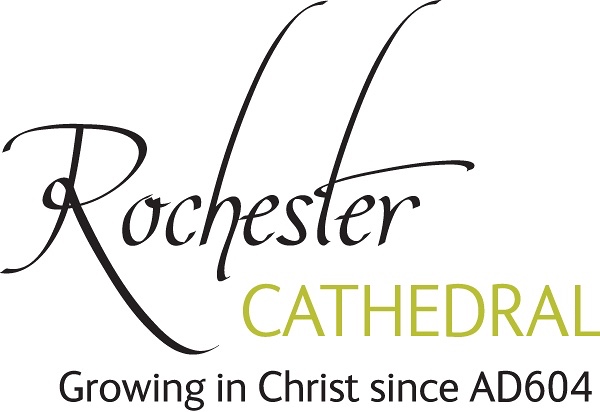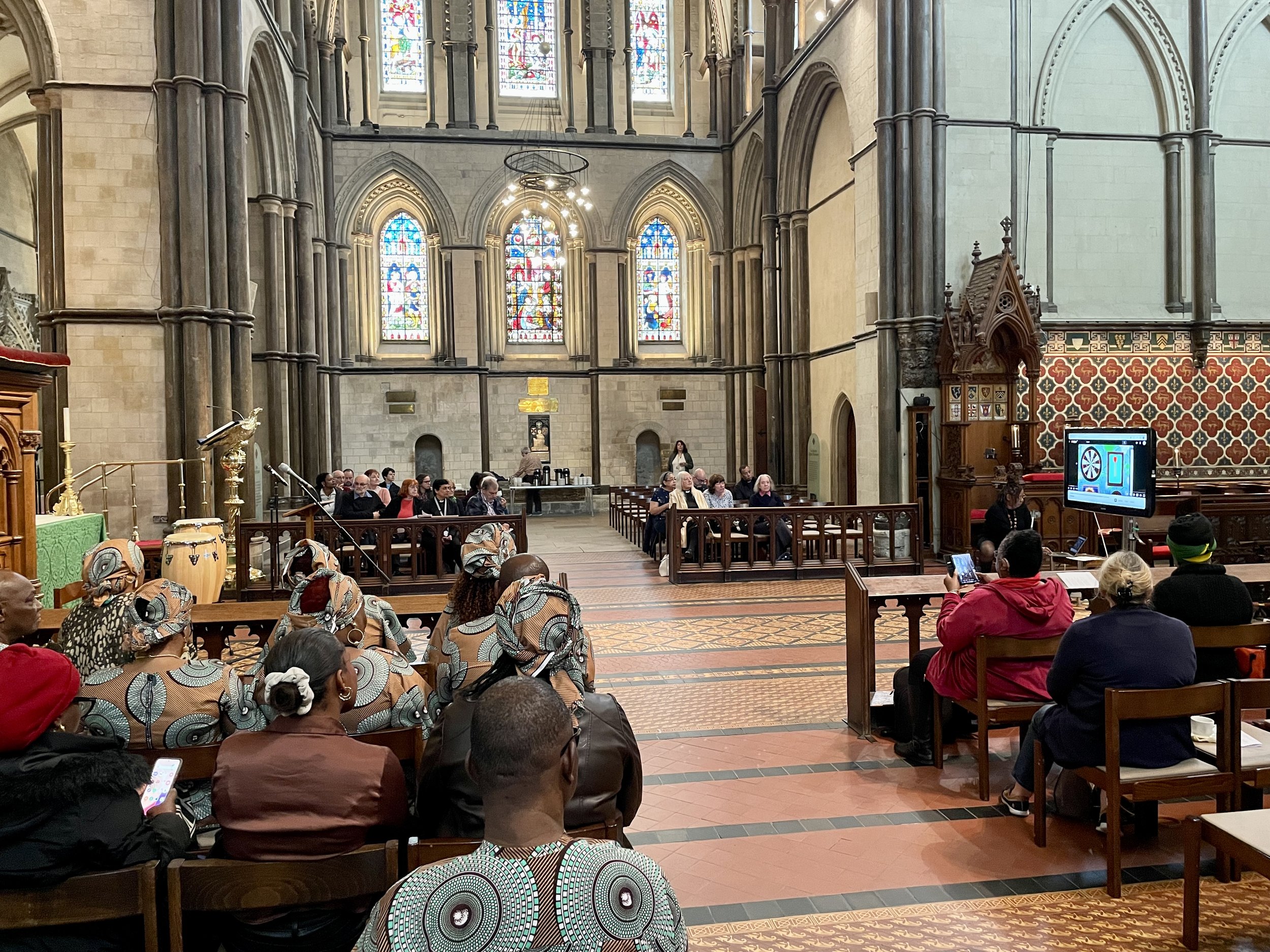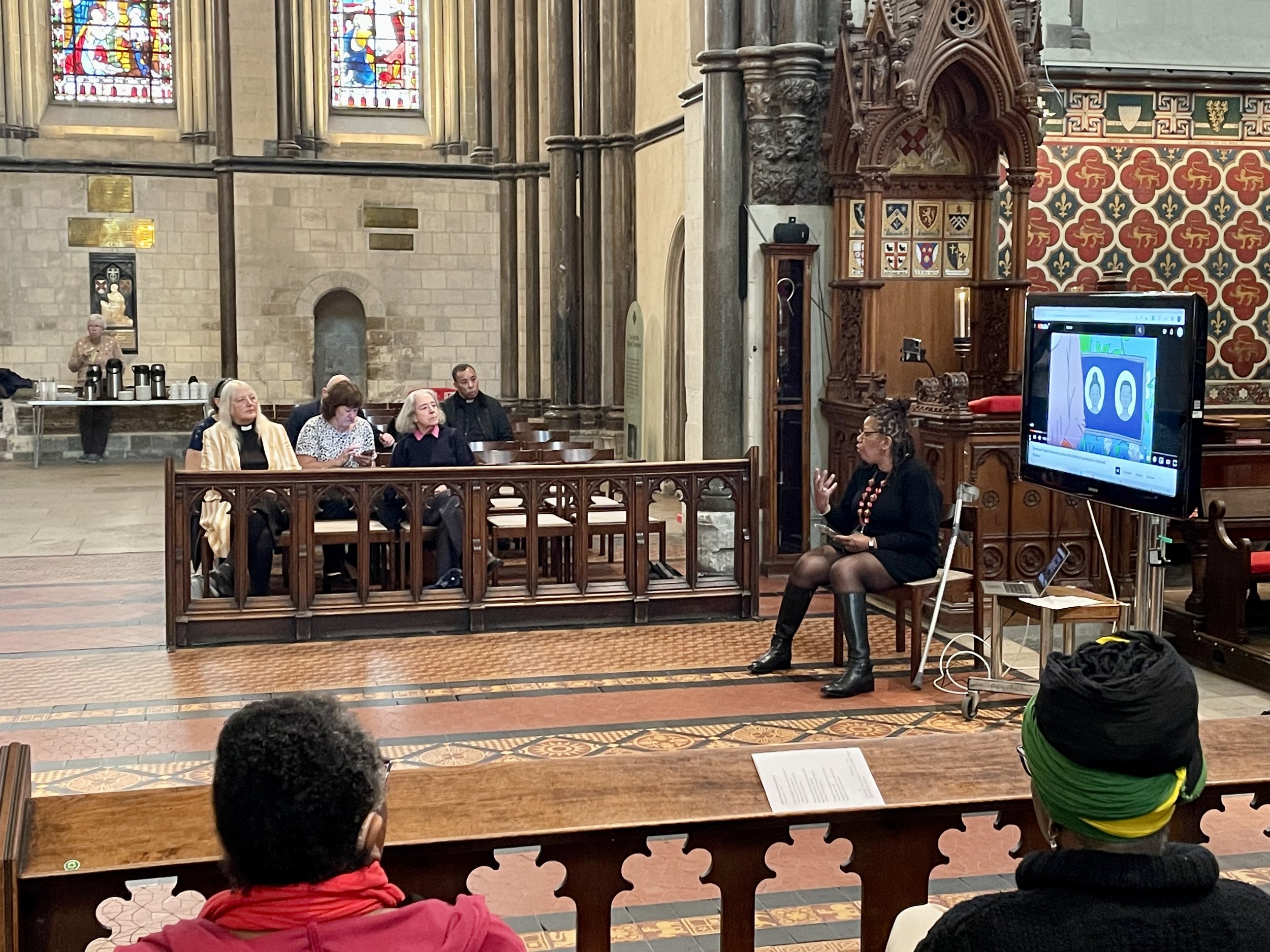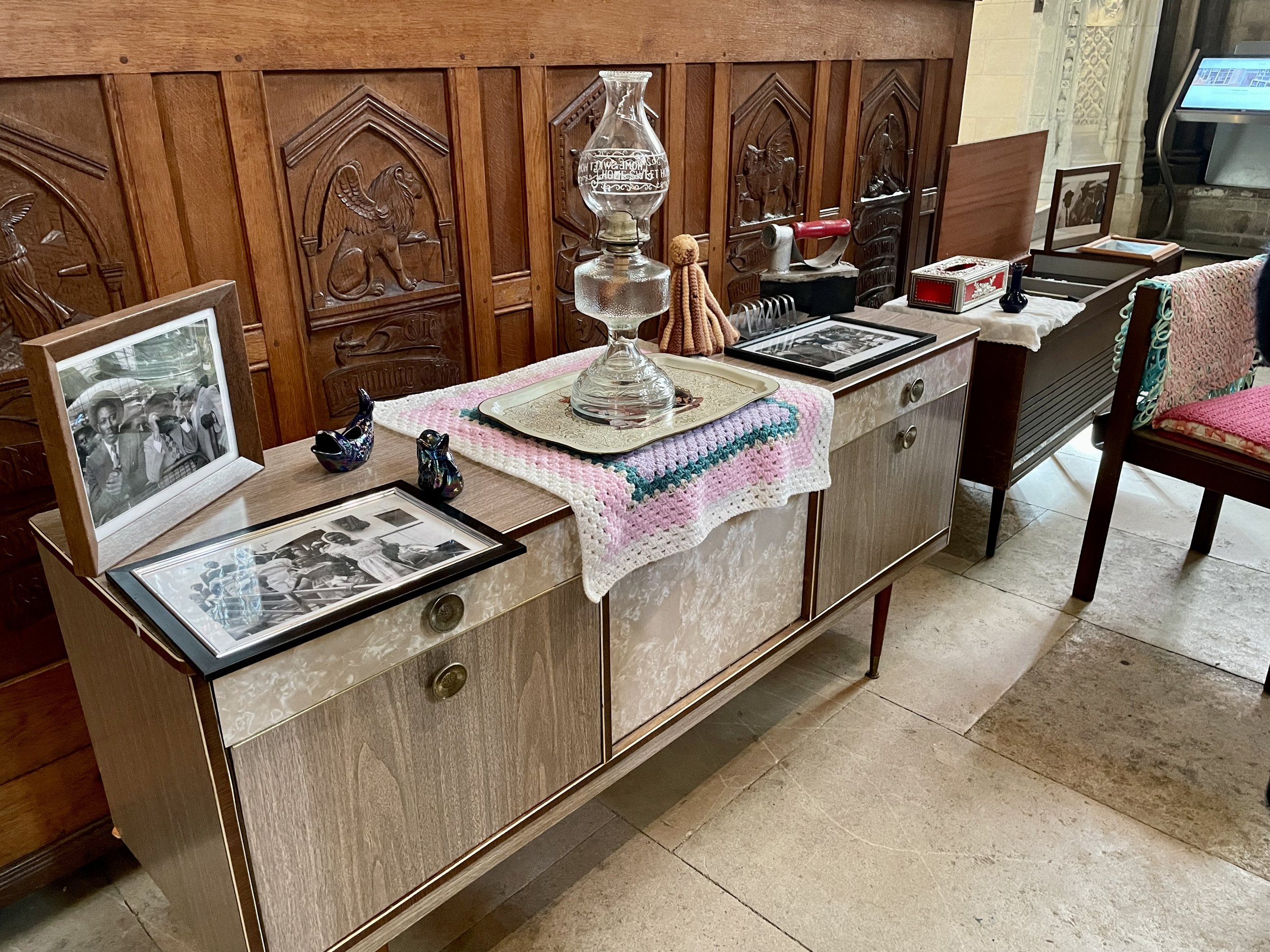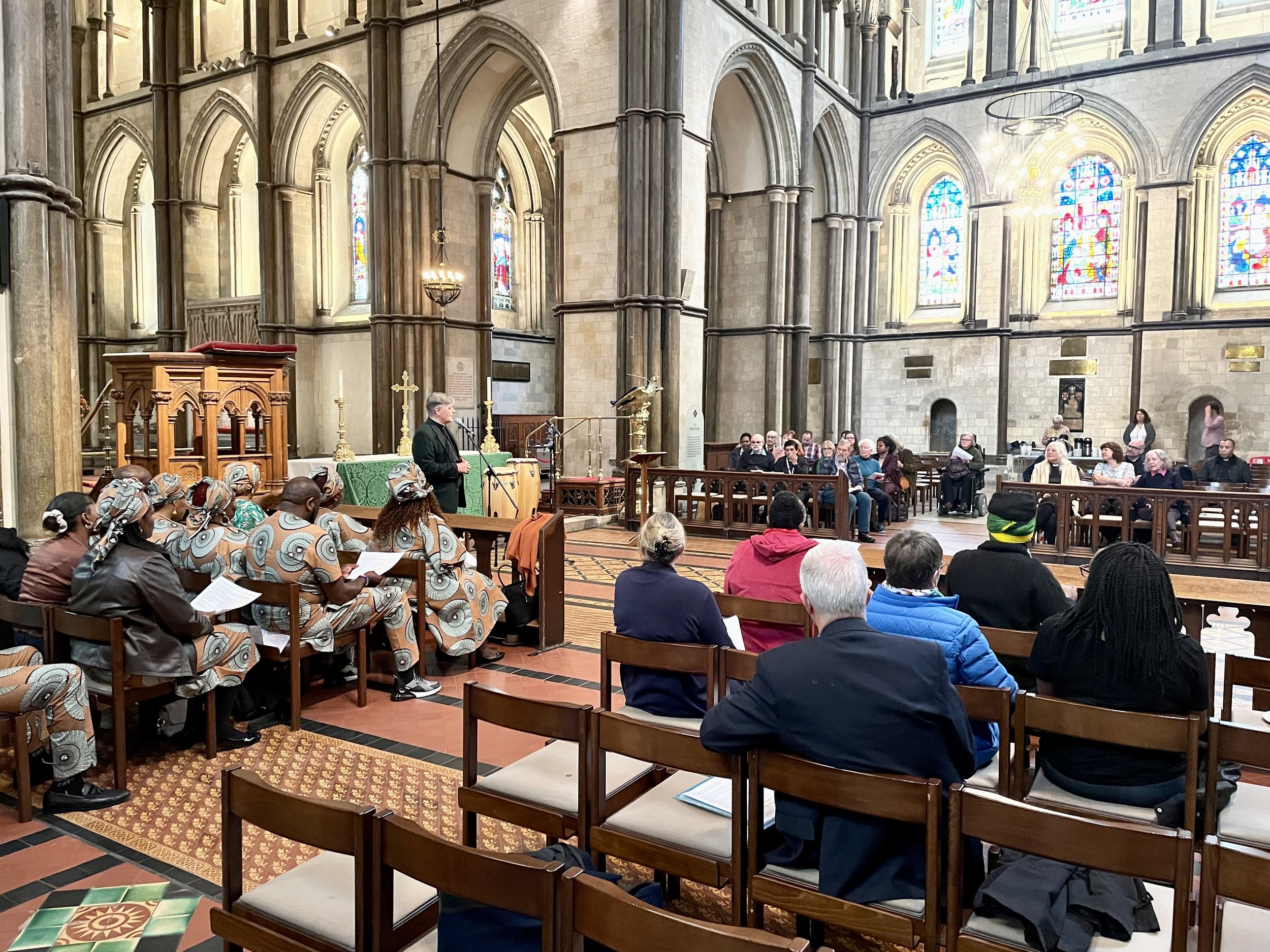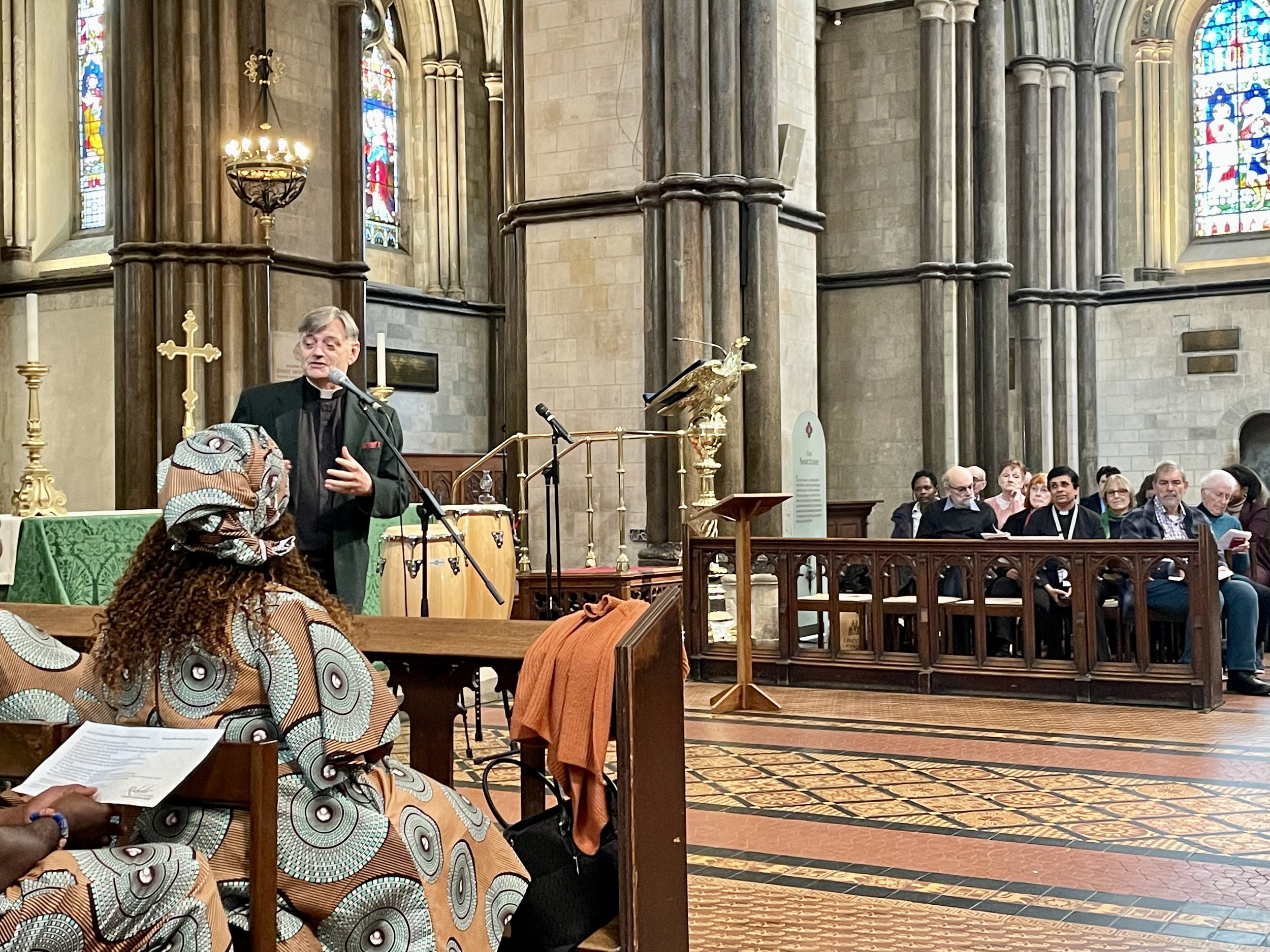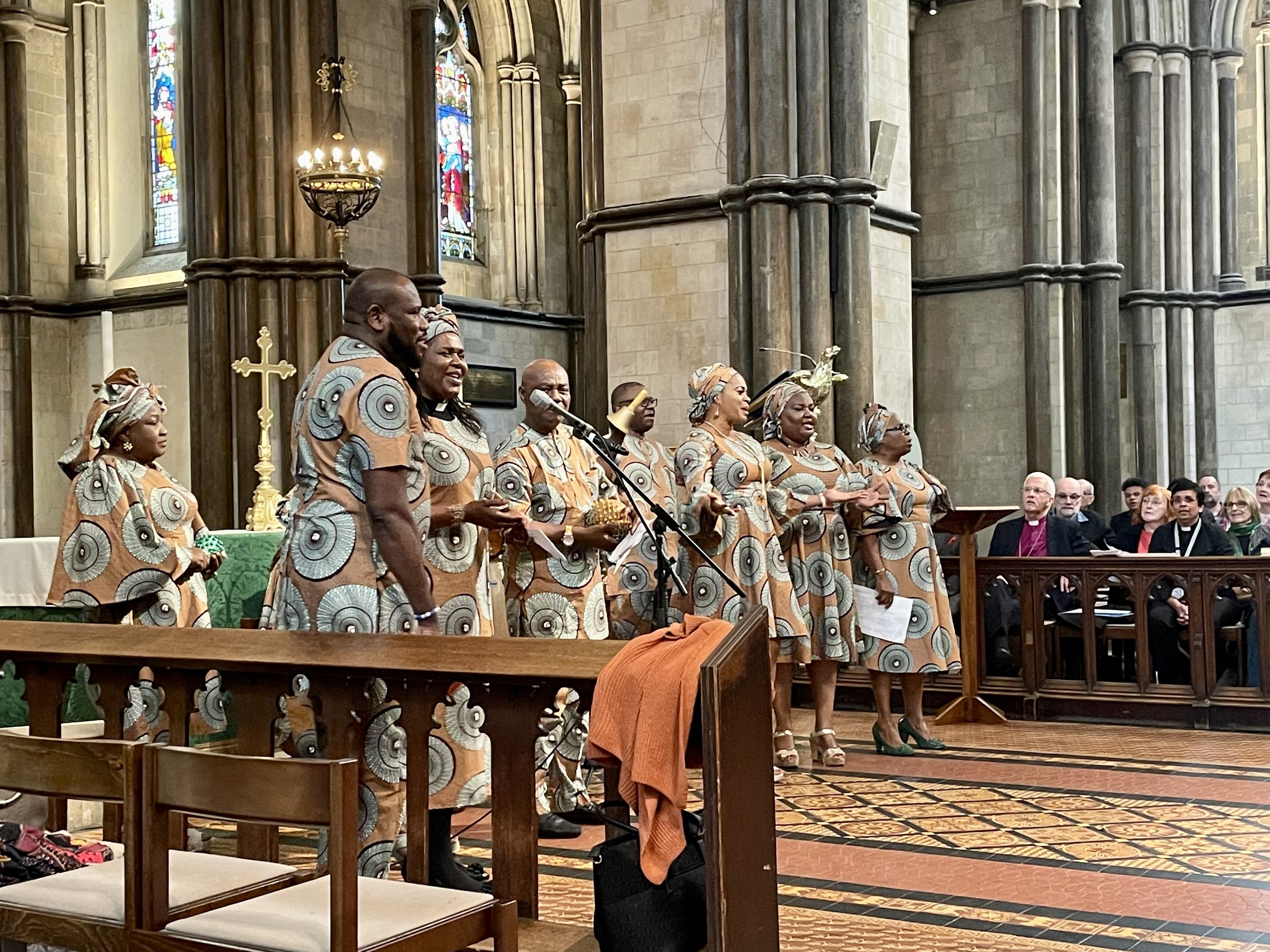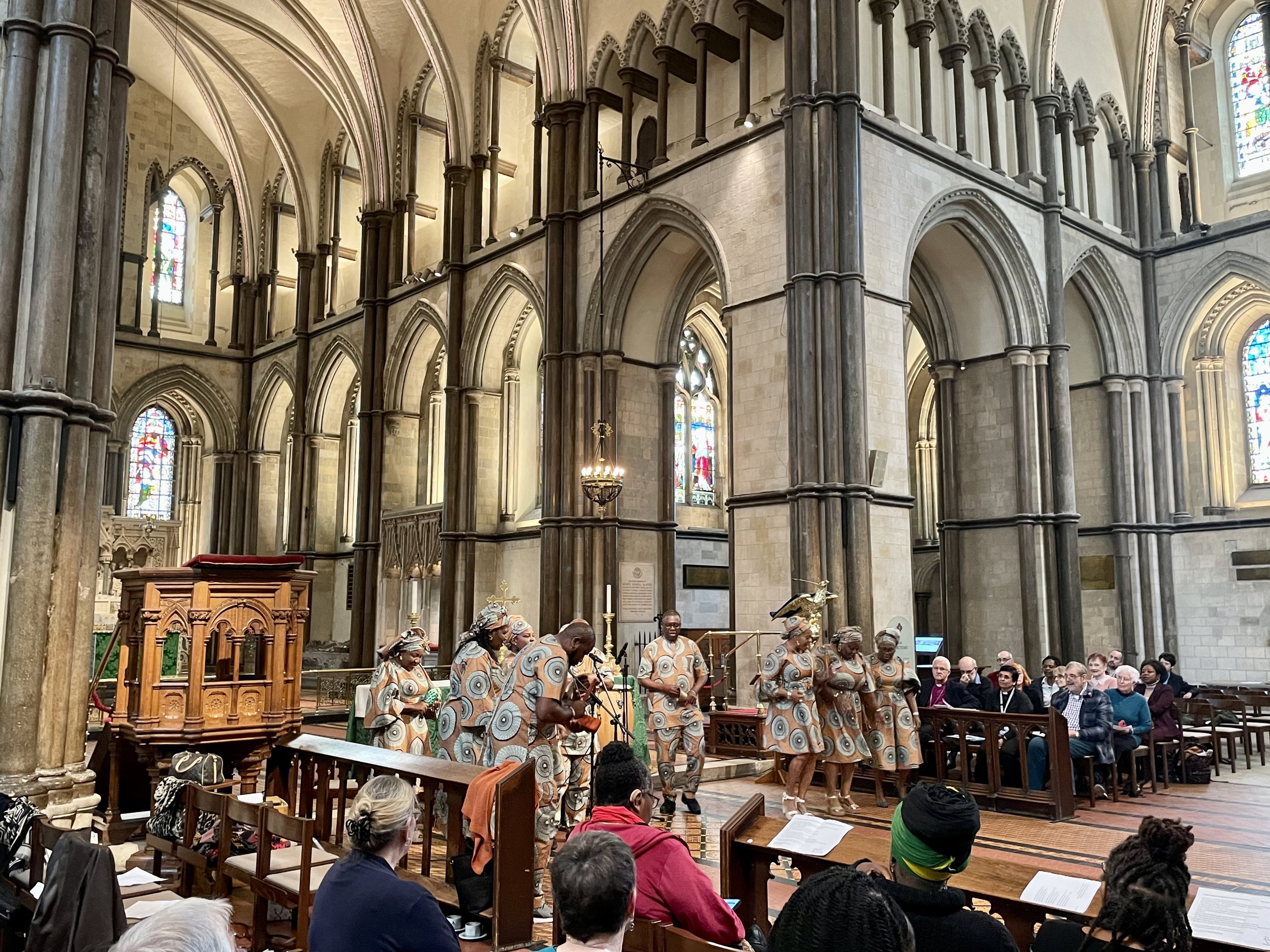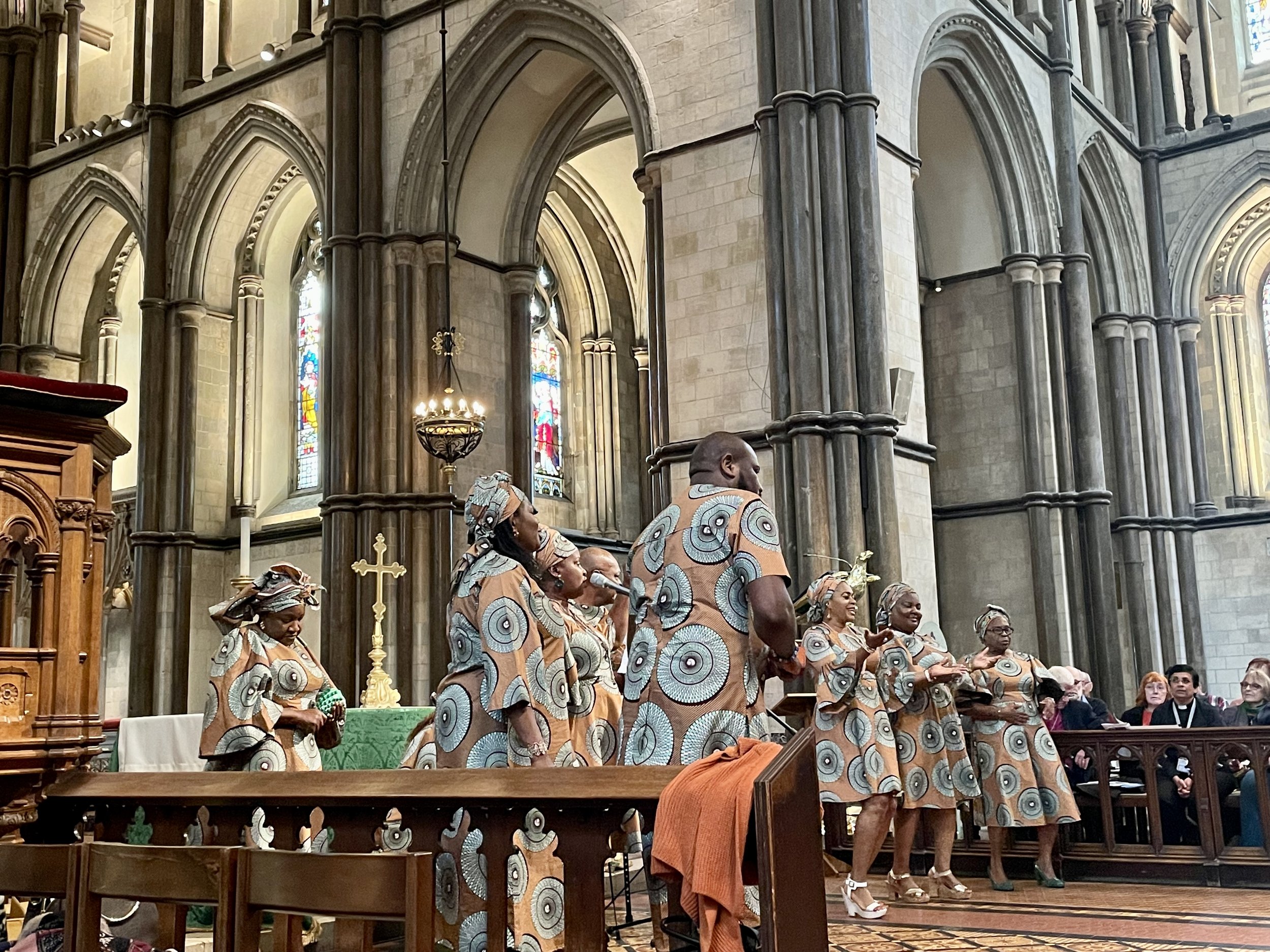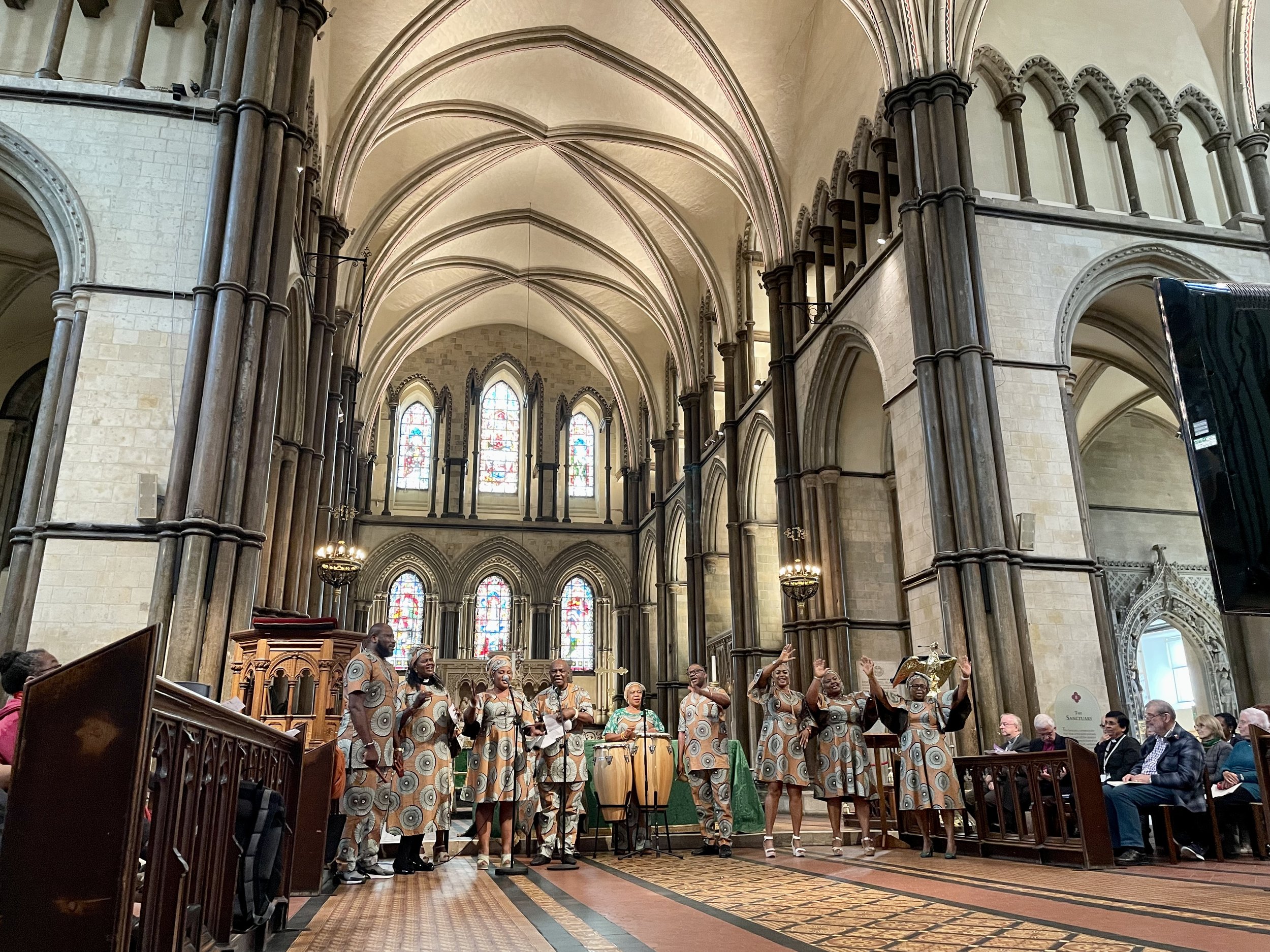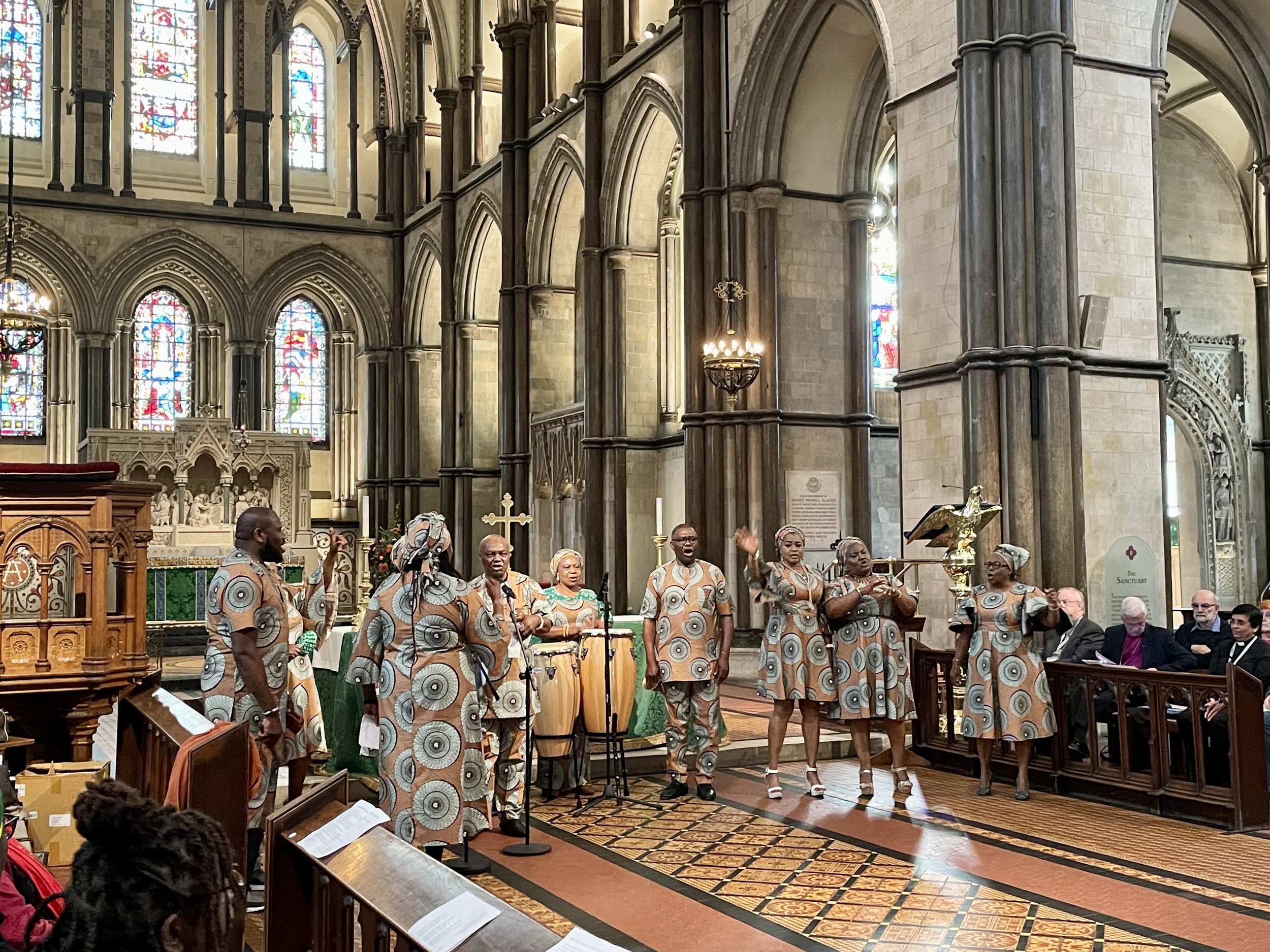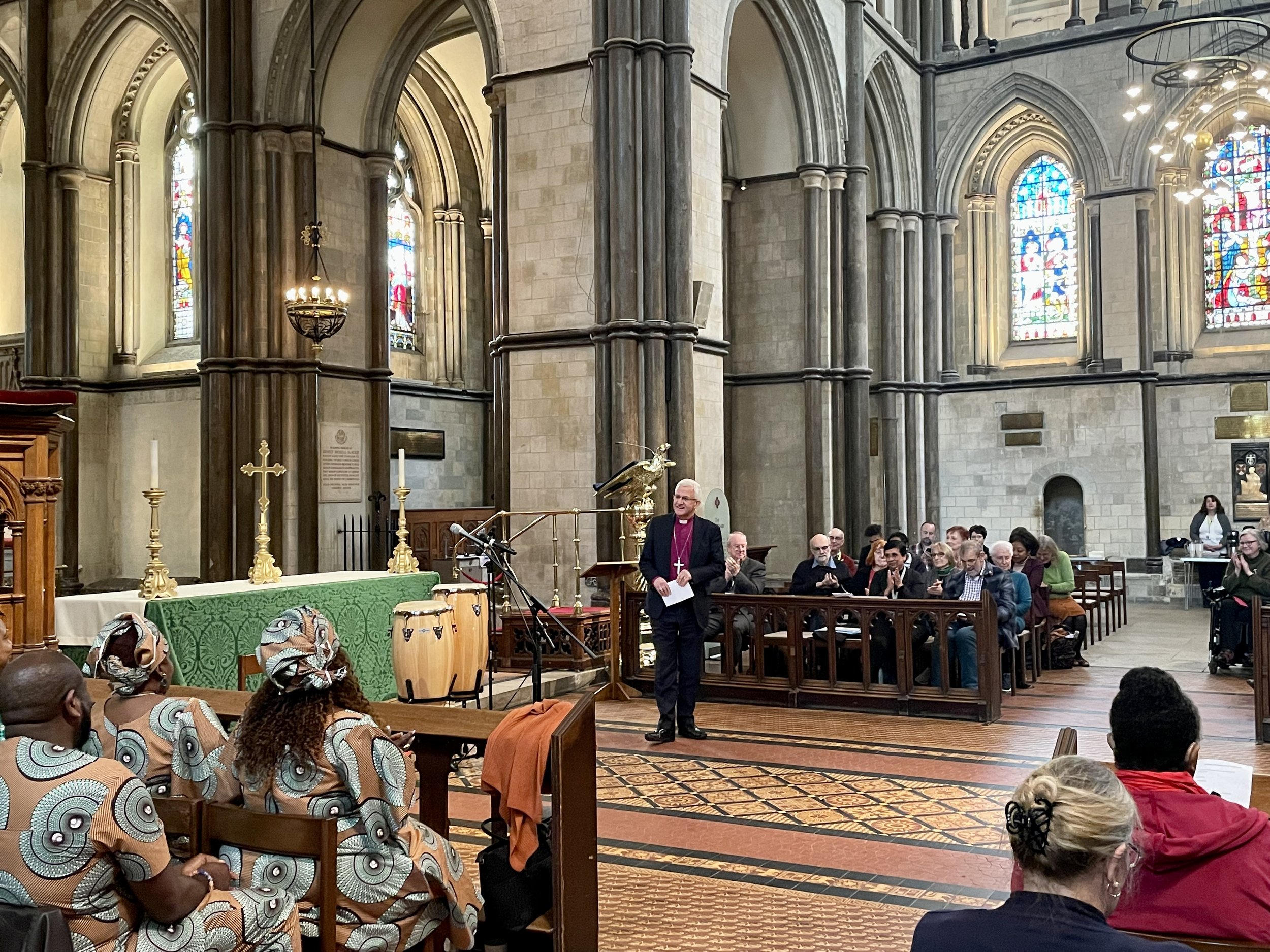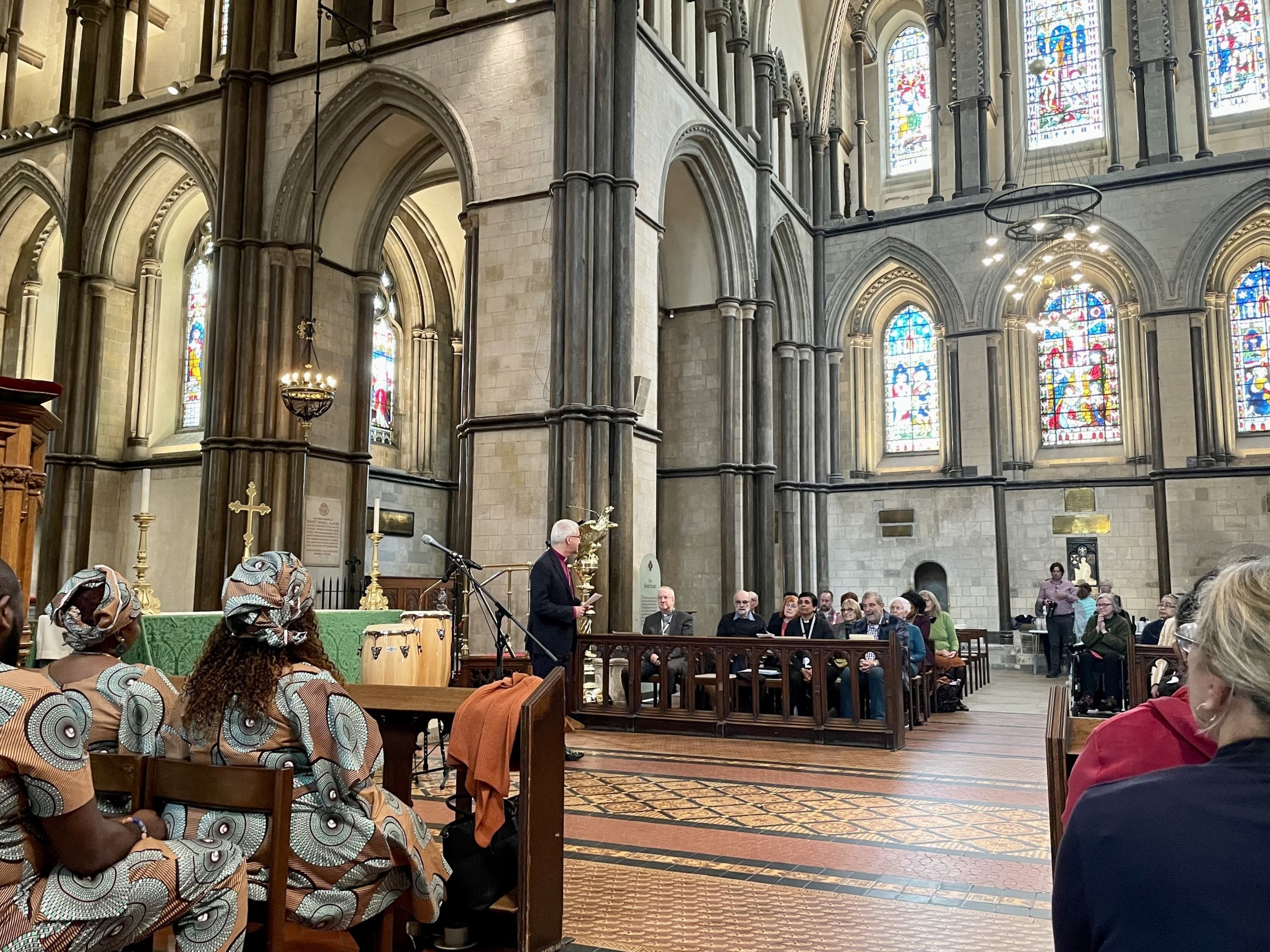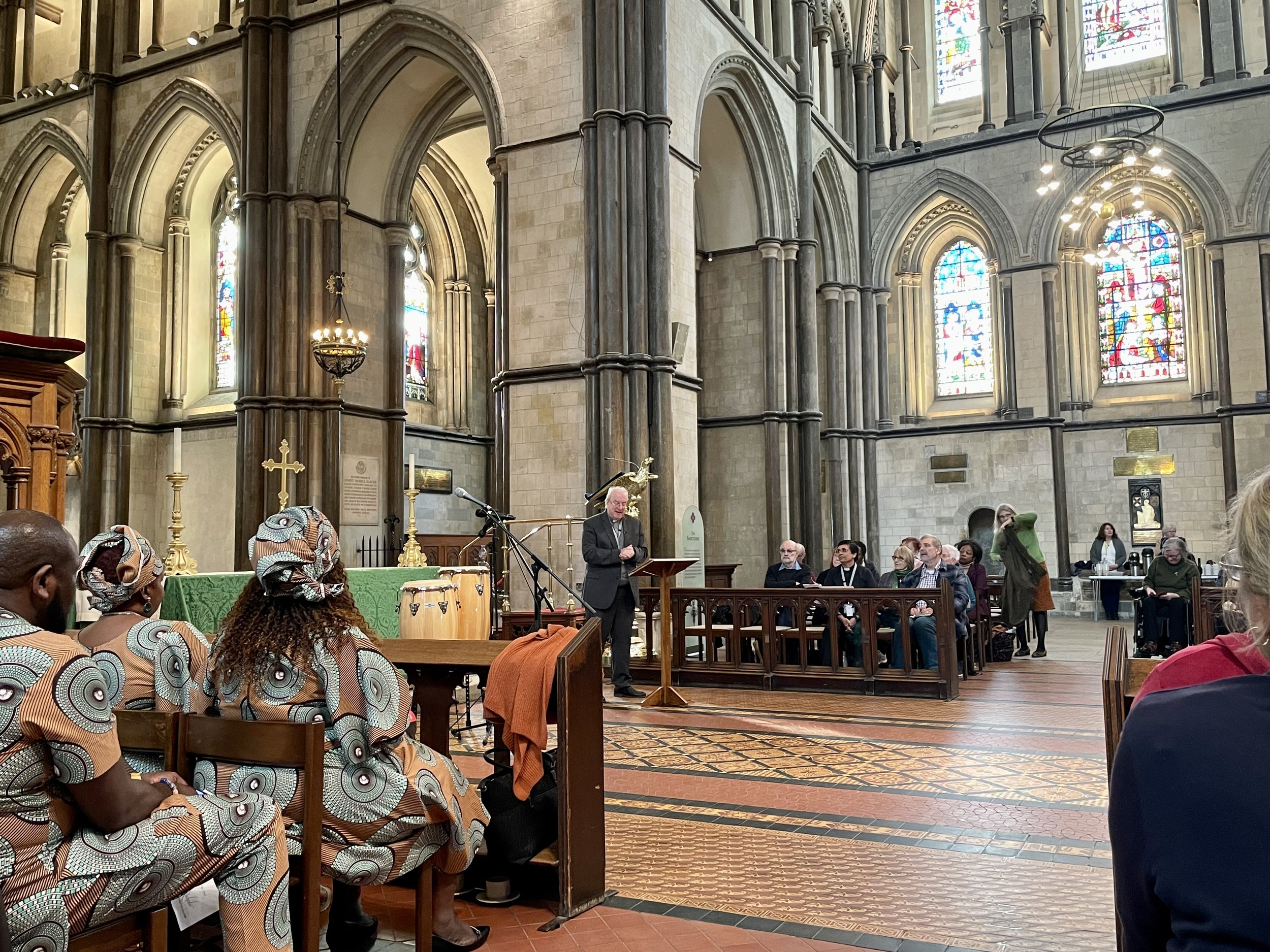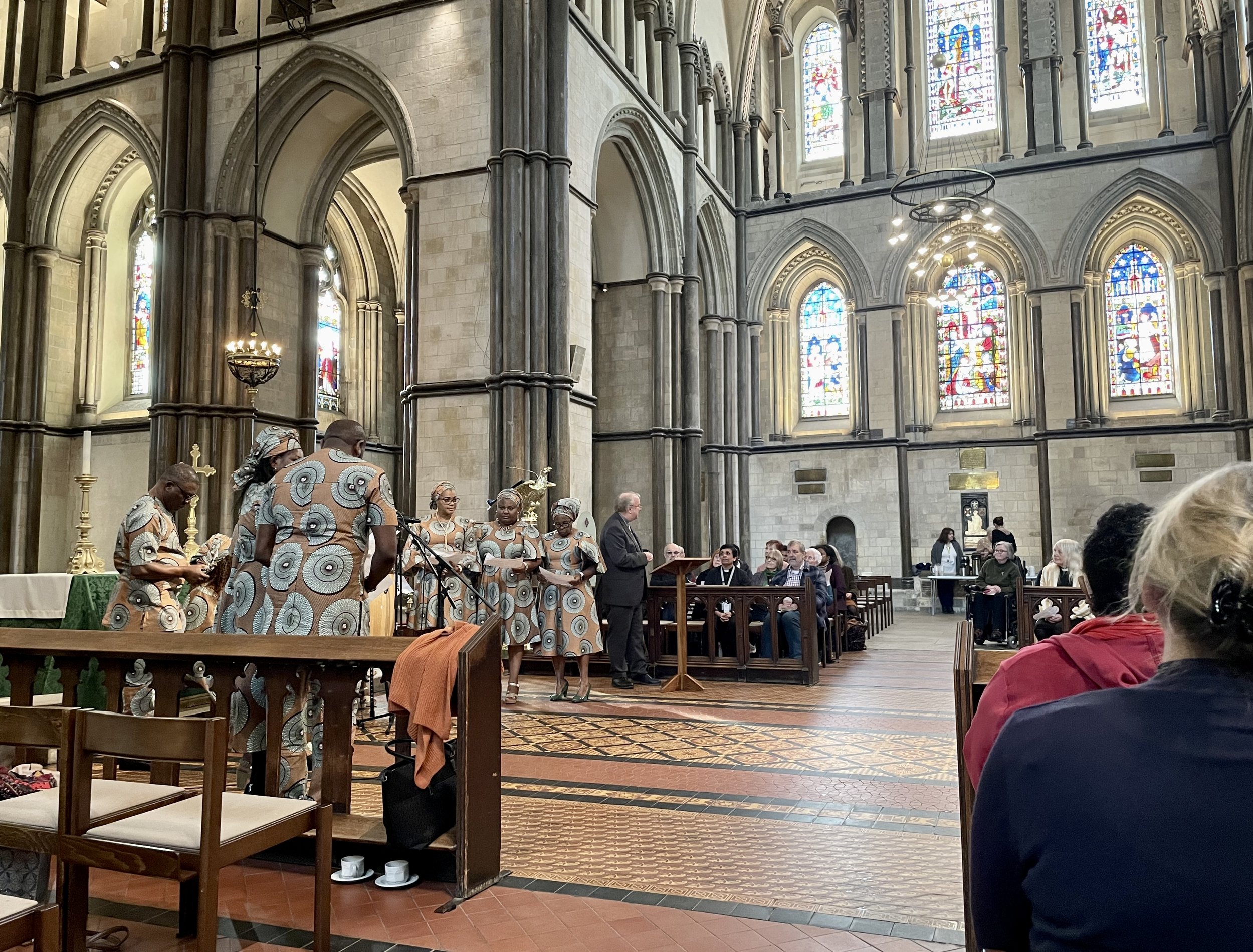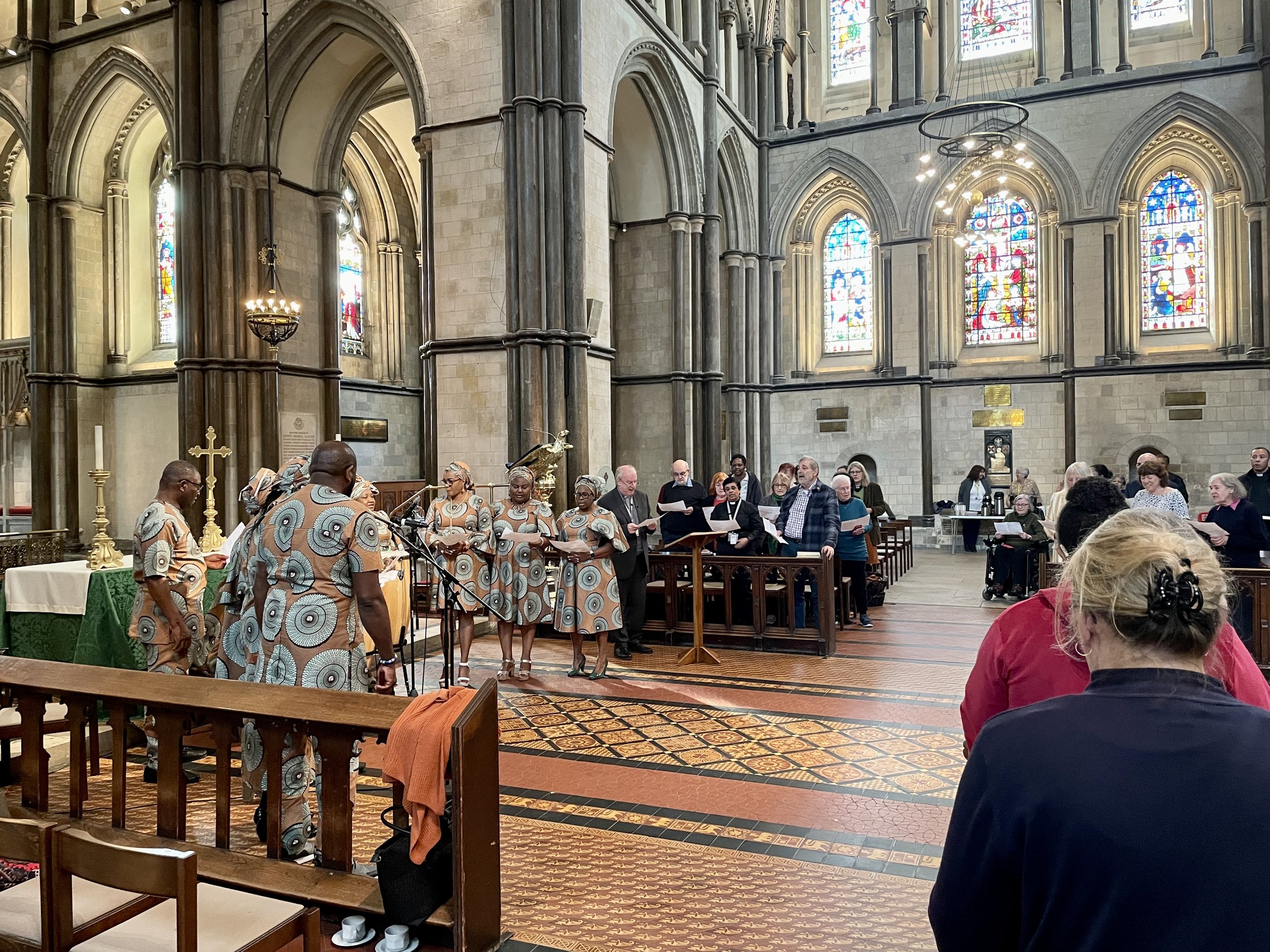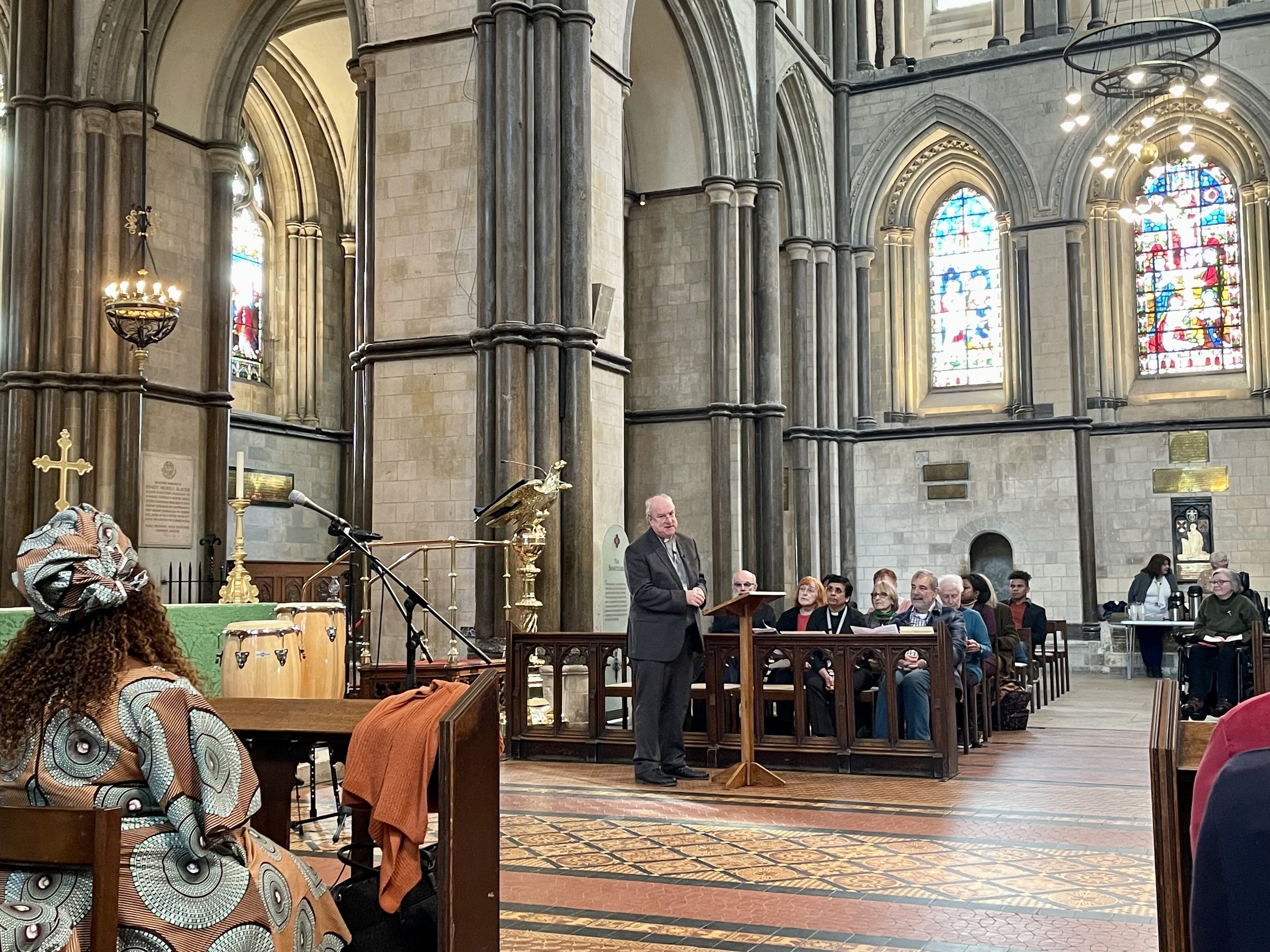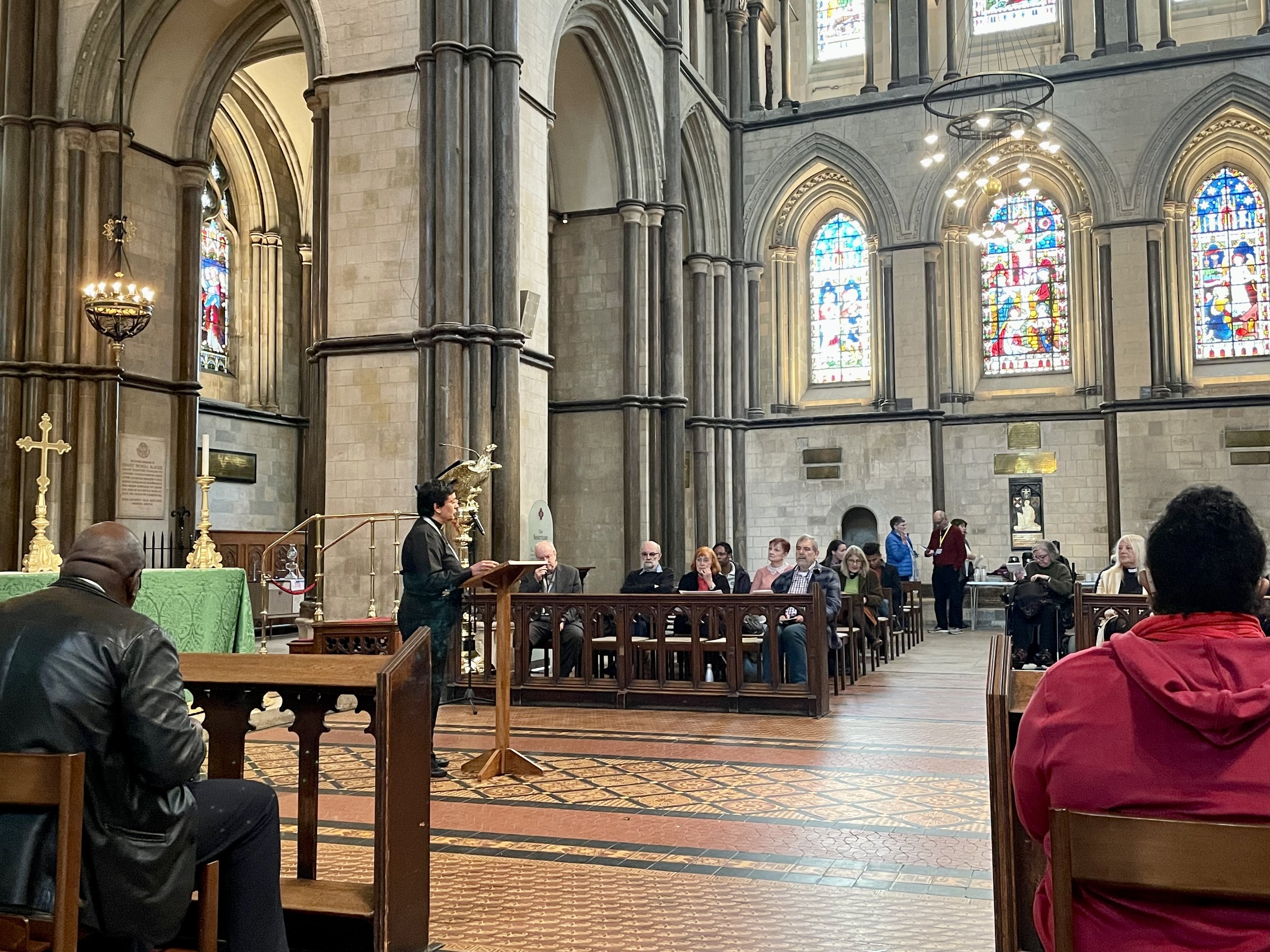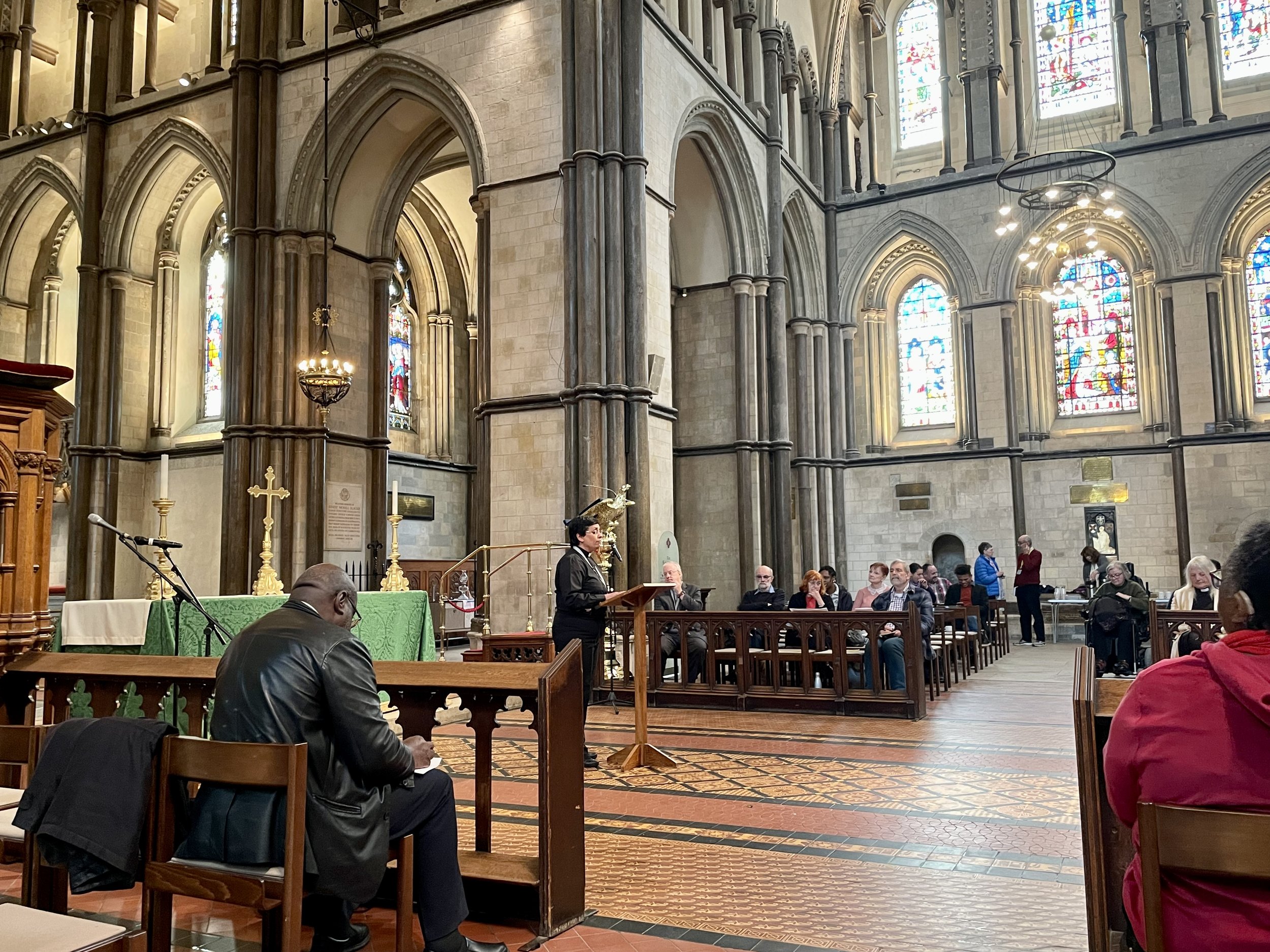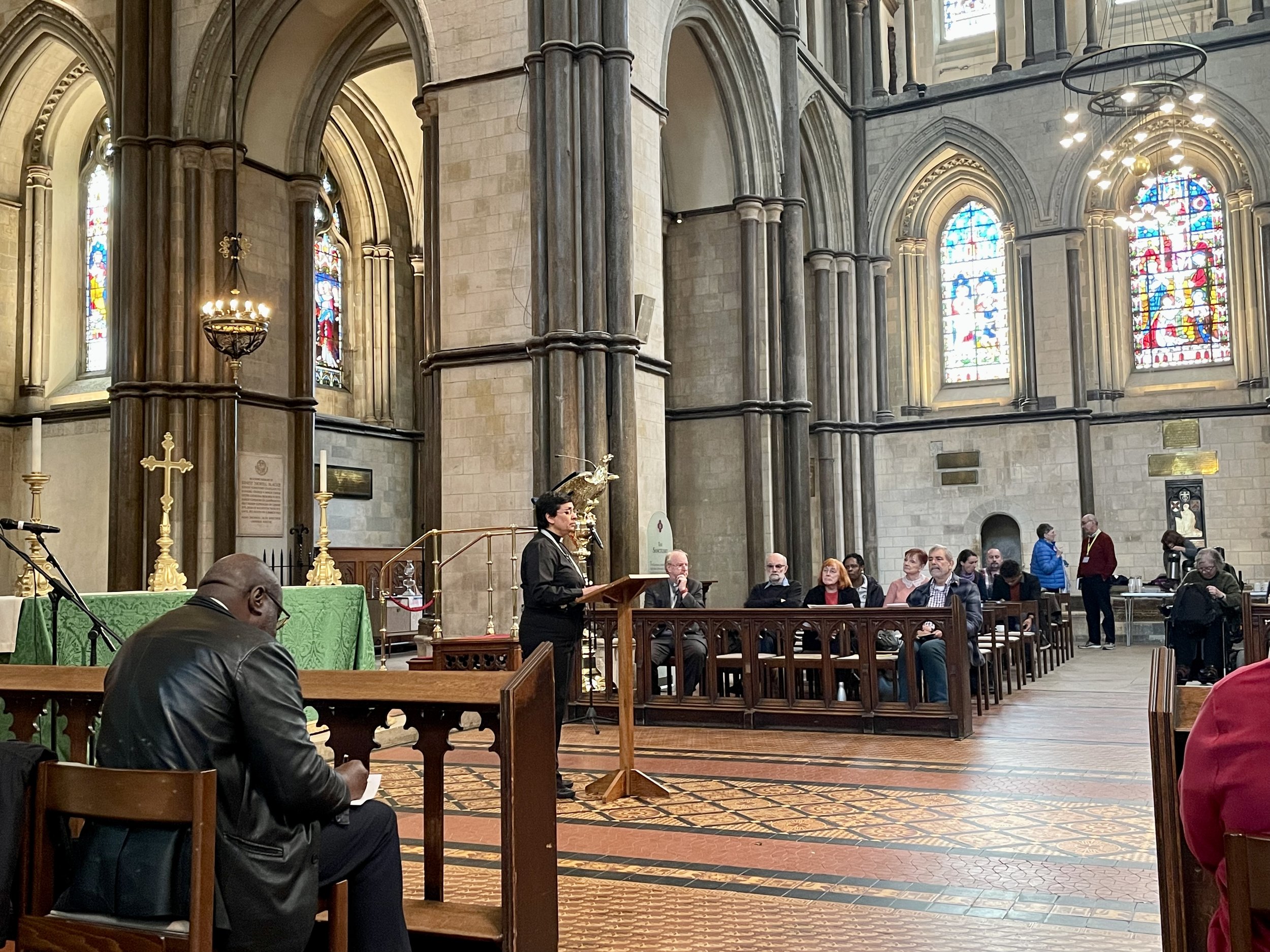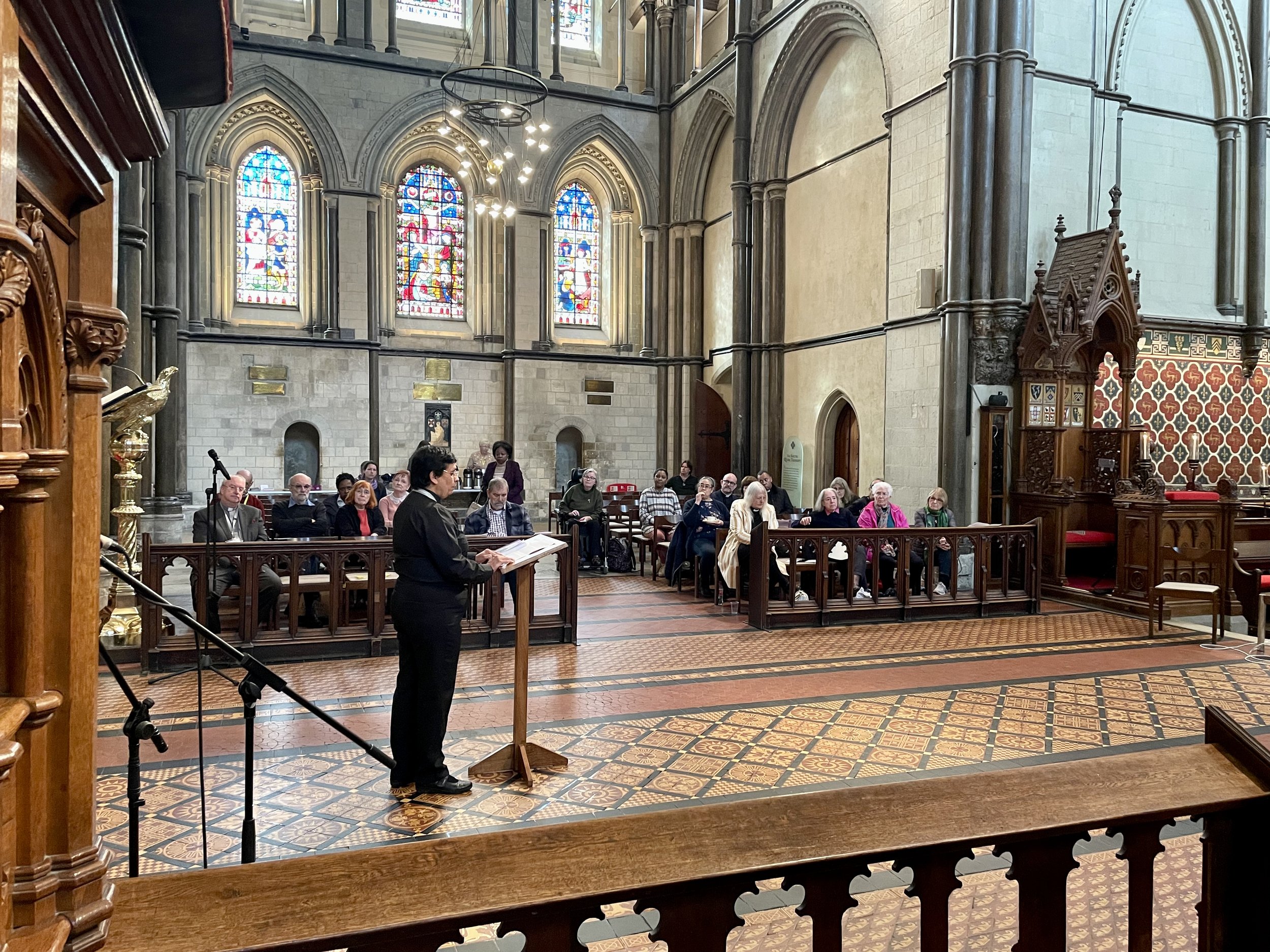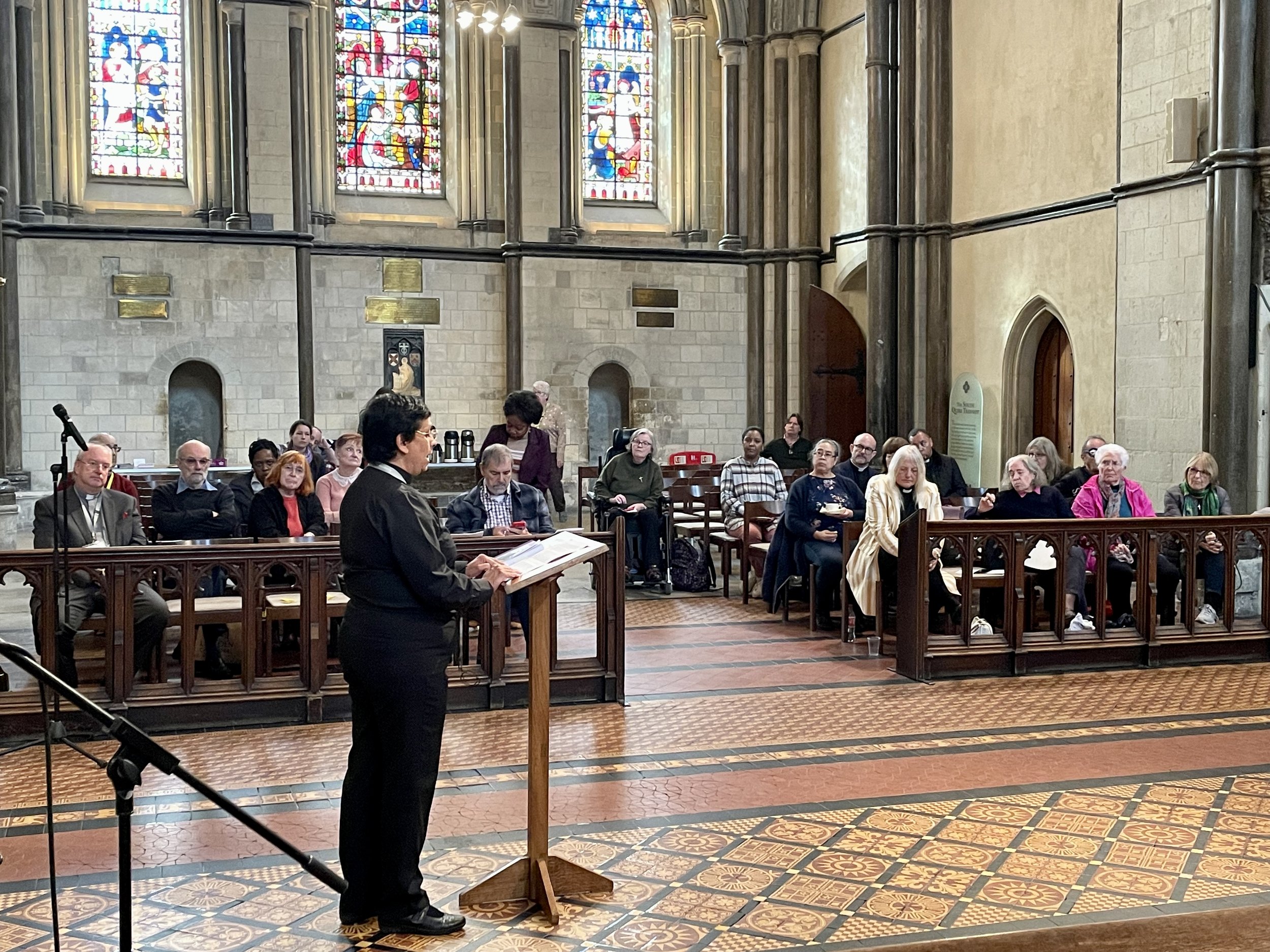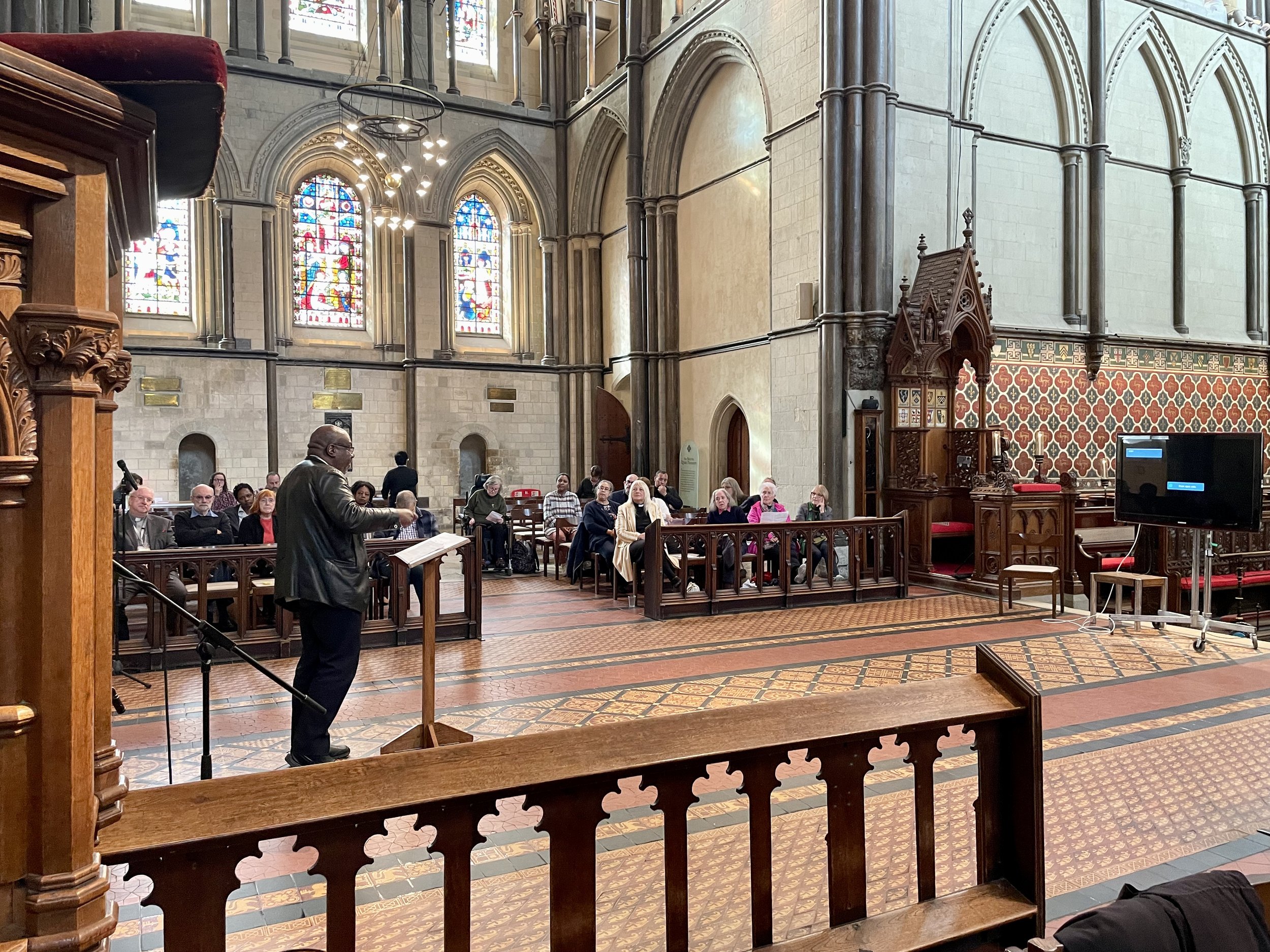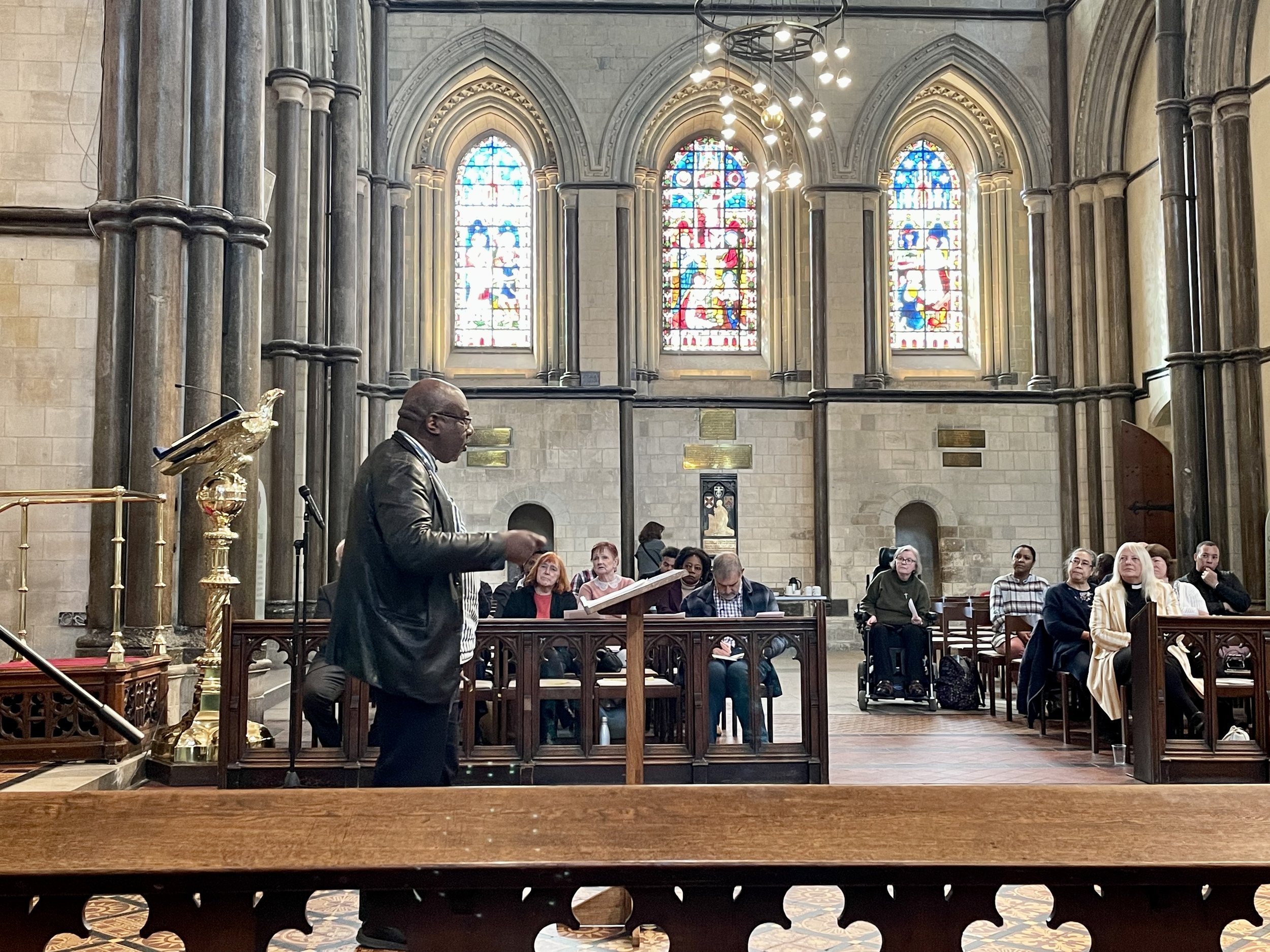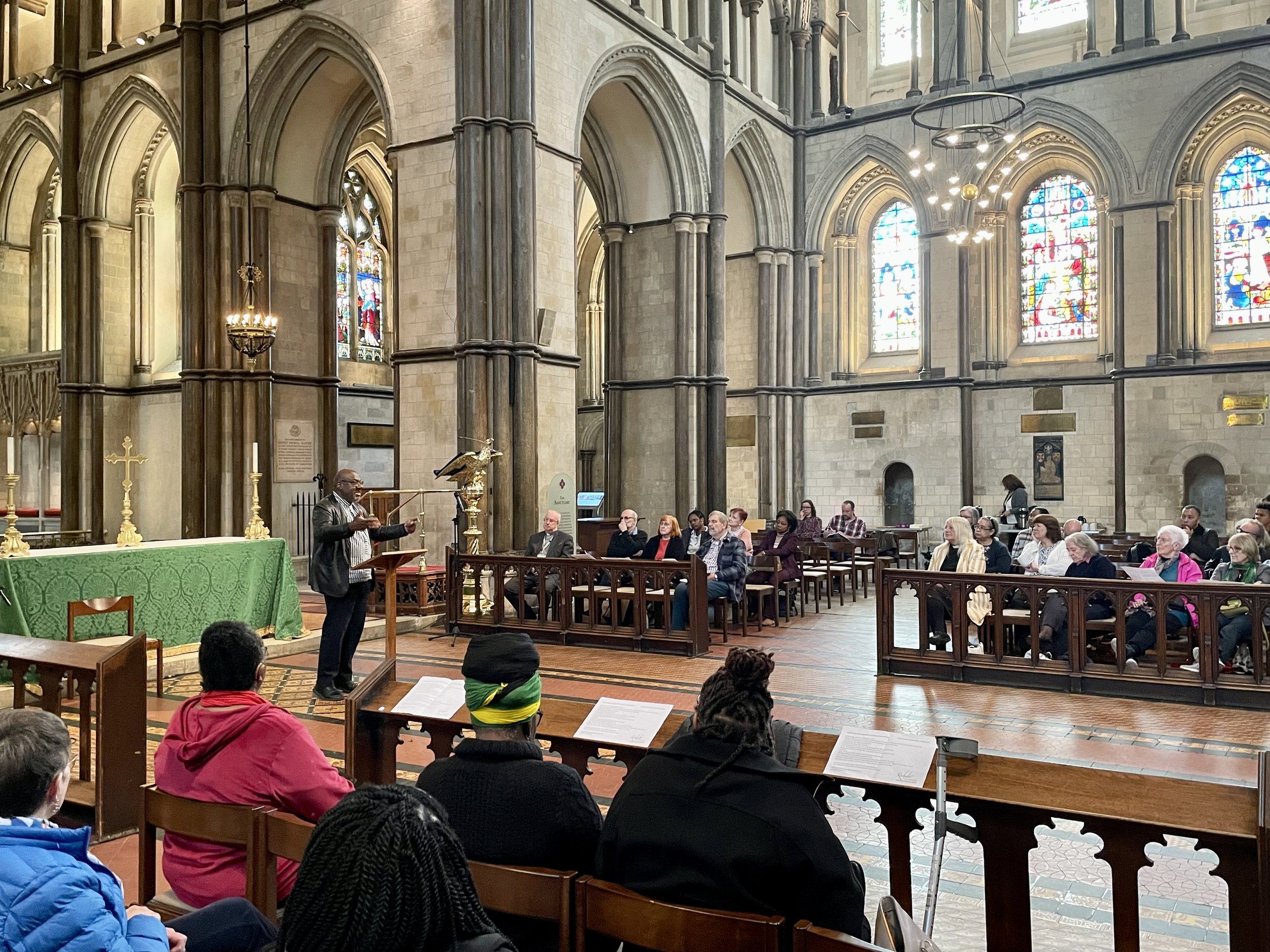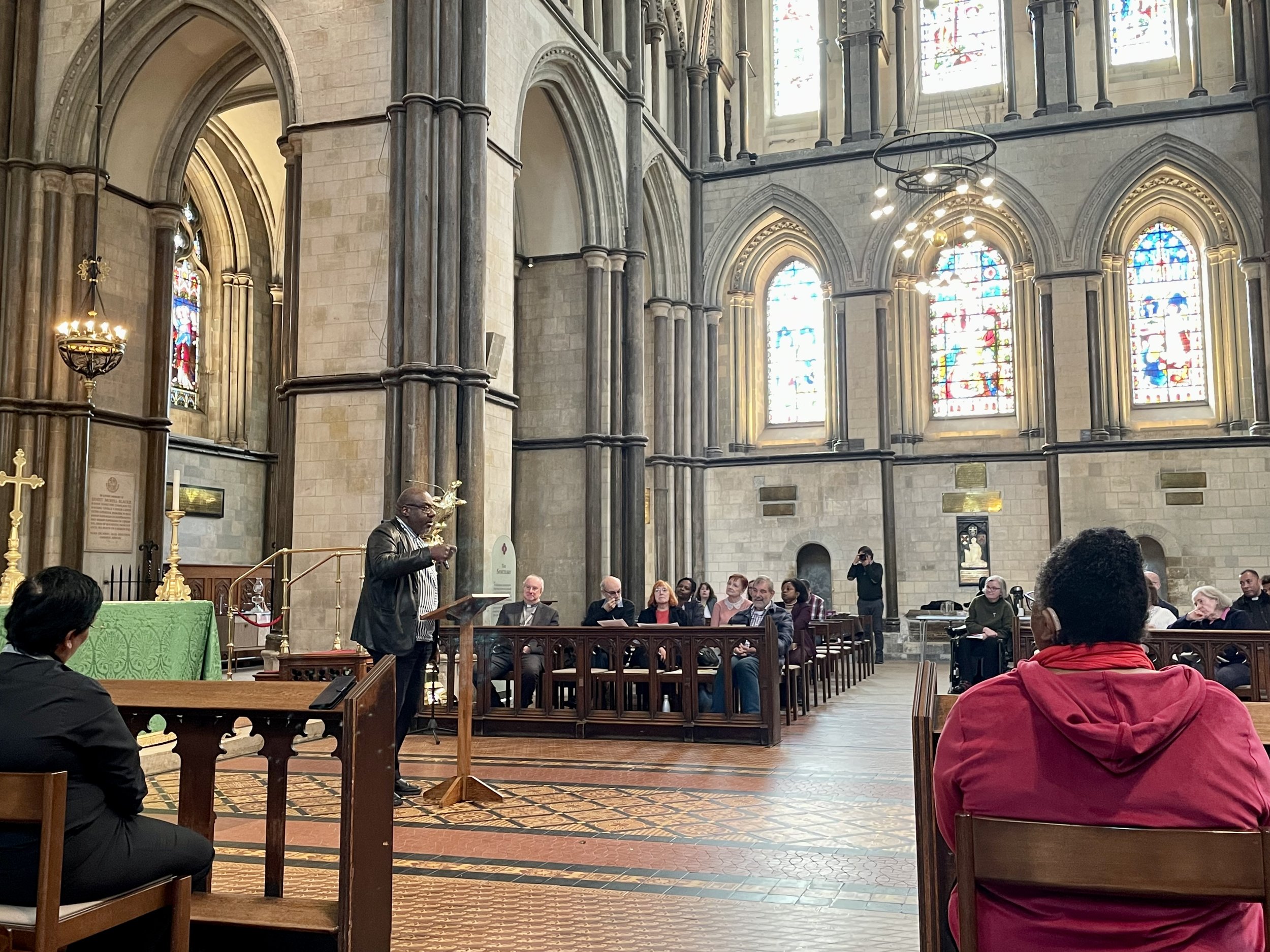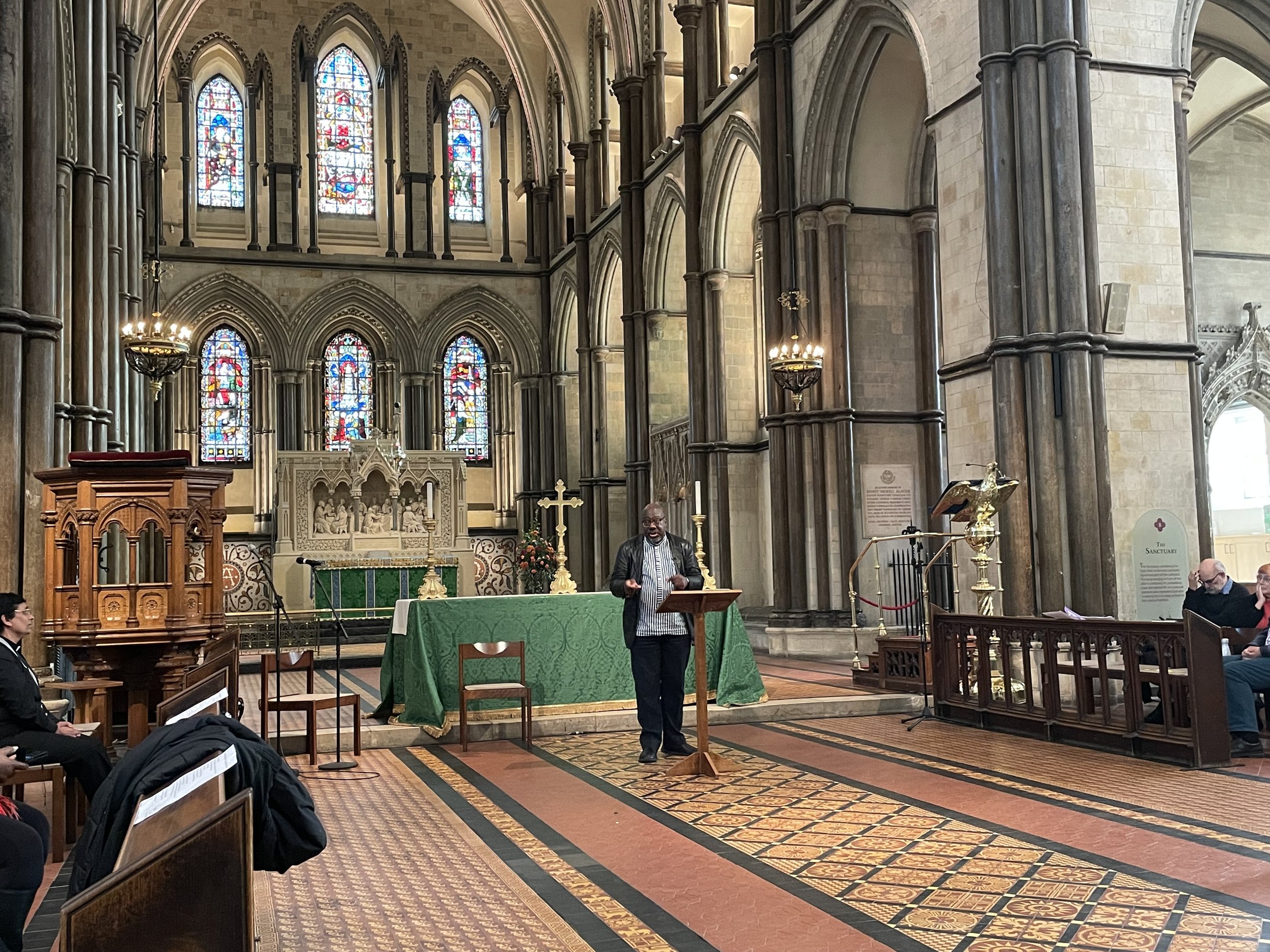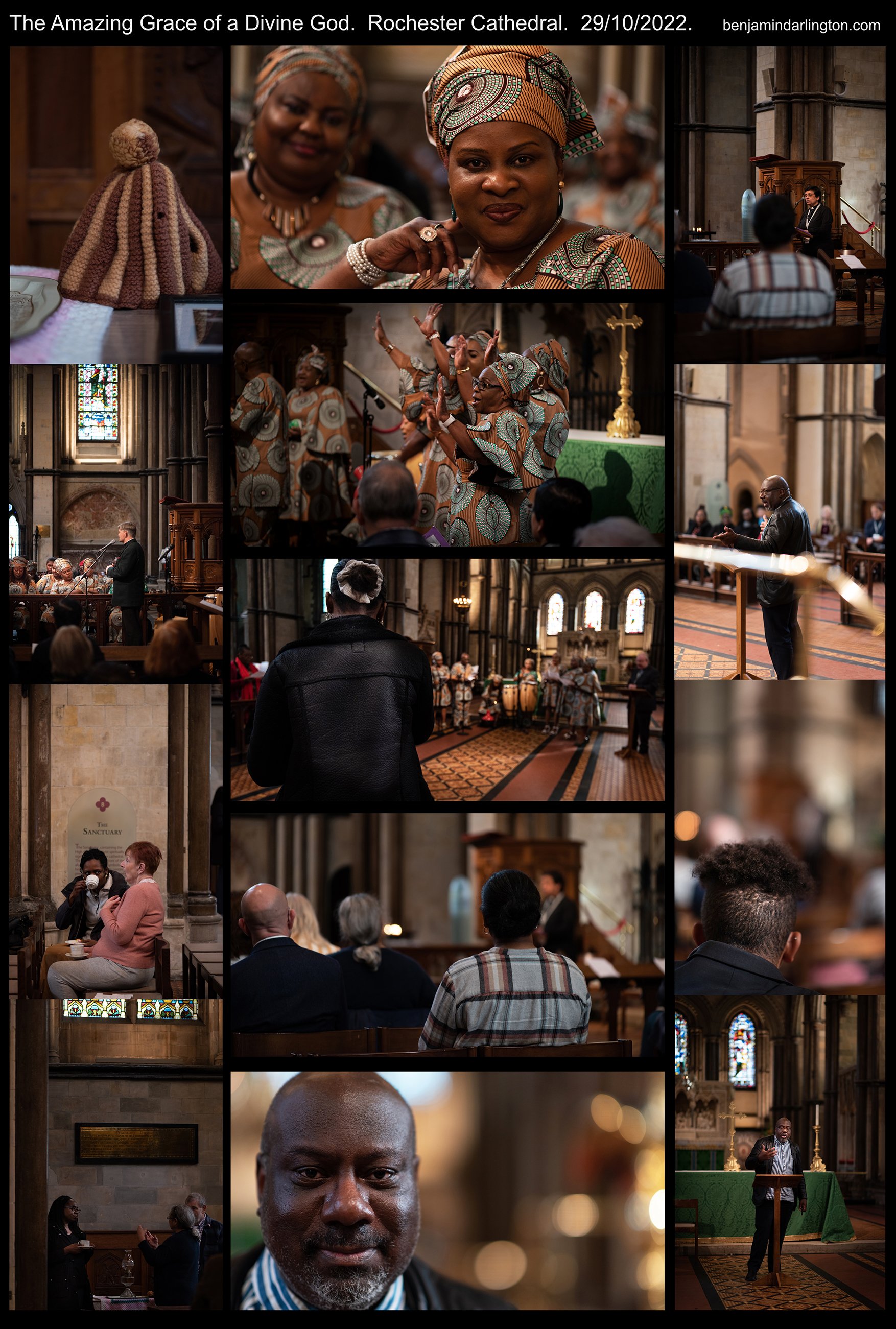Black History Month 2022
/
Black History Month 2022
November 21, 2022
In the UK, October is the month which is observed as Black History Month. First celebrated in 1987, it provided an opportunity for the contribution made by people of African and Caribbean backgrounds to be recognised.
It is now marked in various parts of the world though not always in October in recognition of the experiences, achievements, culture and contributions of people of colour not just in the colonial diaspora. At Rochester Cathedral this year, we are proud to have hosted some key events and exhibitions that impact the historical story we have to tell here in Rochester.
The Lampedusa Cross and the associated exhibit called Dark Water, Burning World by Syrian artist Issam Kourbaj, which can be seen in the Lady Chapel until 25th November reminds us of our long connection over time with refugees. The Lampedusa Cross, created out of the wood of the wreckage, tells a story of Eritrean and Somali refugees fleeing their countries for fear of persecution, when their small boat caught fire and sank off the coast of the island of Lampedusa, leaving 311 people dead. From their own small resources the islanders risked their lives to rescue as many people as they could. The women opened their kitchens and fed the refugees. The carpenter, Francesco Tuccio fashioned little crosses as symbols of their salvation and hope for the future. Issam Kourbaj’s small boats laden with tightly packed upright, extinguished matches is evocative of the charred and burned hopes of a people so devastated at having to leave their country and the visible and invisible scars of a terrifying journey on the vast expanse of dark waters, once beautiful and abundant. Ironically the term, ‘Leave to Remain’, which is coined to describe a specific refugee status giving permission to stay, is re-interpreted to imply that by leaving a place, a return home may be possible.
In the face of unprecedented migration, we are challenged to ponder over what it is that might provoke a mother to put her young son into a small boat crammed full of equally desperate people and watch it drift away into the darkness, not to be seen again. What if by challenging policies and actions which unfairly penalise the poorest and weakest in our world, a more equitable sharing of resources could be achieved so that people in all countries and all corners of the world were able to sustain a standard of living that does not require them to leave their homeland in search of something better?
Our Black History Month focus was on a black African man who was rescued from slavery and baptised and received into the Anglican Communion, later to be ordained and consecrated as the first black Anglican Bishop at Canterbury Cathedral in 1864 because of his persistent and successful work in the spread of Christianity on behalf of the Church Missionary Society among the ‘heathen’ tribes along the Niger river in West Africa. While his faith in Jesus Christ remained as strong as ever until the day he died, his confidence and trust in his fellowmen, especially his white missionary colleagues was severely dented when their racist attitudes led them to question the intellectual capability of black leaders and their leadership not only in white circles, but also within their own communities. Bishop Samuel Adjai Crowther (the great, great grandfather of Arnold Awoonor-Gordon, member of our cathedral congregation) died and was succeeded by a white Bishop and it wasn’t until 60 years later, in 1961, that the next black Bishop for West Africa was consecrated. It is interesting to stop and mull over how far the Anglican Communion has moved since then.
The Reverend Belinda Beckhelling,
Cathedral Curate
Featured in the Rochester Cathedral Newsletter November 2022
The Amazing Grace of a Divine God
Black History Month event 29th October 2022
Our Black History Month event featured Reverend Belinda Beckhelling telling the story of Adjai Crowther the first black Anglican bishop. Canon Gordon talked about the ‘bittersweet grace’ in John Newton’s amazing hymn, the Rochester and Chatham connections, and a discussion on eighteenth-century slavery. The final keynote speaker was Professor Anthony Reddie on the legacy of James H. Cone for black theology. You can watch, listen or read a transcript of the talks below.
Photos from the event including greetings from the Dean of Rochester The Very Reverend Dr Philip Hesketh, the Bishop of Rochester The Right Reverend Dr Jonathan Gibbs, a Windrush generation exhibition with an introduction by Carol Stewart, Chairperson of Medway African and Caribbean Association, and music by Unique Igbo Melodies
The Reverend Belinda Beckhelling introduced Bishop Samuel Adjai Crowther, the first African Anglican bishop of West Africa. From the notes of Arnold Awoonor.
The 150th anniversary of the consecration of Bishop Crowther was the subject of a thanksgiving service at Canterbury Cathedral in 2014. An apology was issued and prayers of repentance were said for his later betrayal by other Anglicans.
The Reverend Canon Dr Gordon Giles introduced prominent Anglican cleric and slavery abolitionist John Newton. Talk delivered at the Black History Month event ‘The Amazing Grave of a Divine God’ at Rochester Cathedral.
The Legacy of James H. Cone: The Founding Father of Black Liberation Theology by Professor Anthony Reddie
Open Facebook Video
Children of the Resurrection
The following sermon was delivered by The Reverend Belinda Beckhelling at Rochester Cathedral on the 6th November 2022.
I was recently chatting with my father, who will be 90 next year and he mentioned a desire to retire for the rest of his remaining time on earth to Goa. It baffled me that, from the time just before his marriage, he had made a life for himself, outside of Goa, living and working in Malawi where my sister and I were born and at one point in Rhodesia, now Zimbabwe, where my brother was born. He then came to Britain in 1976, since when this is now effectively his home. Here is where all his children and most of their families are based.
More than a little intrigued, I asked him, ‘Why?’. His response took me by surprise. ‘Would you not want to go back to where you were born to die? Would you not want to go home?’ His question set me thinking, ‘Where is home - for someone who has moved around a lot?’
This month of October has afforded me a myriad of opportunities to explore this question.
At the beginning of October I spent a week in a silent retreat at a monastery in Bruges, the ‘ home’ now of fifteen or so monks, men who had come from different walks of life and places.
In our own cathedral we are hosting the Lampedusa Cross which tells a story of Eritrean and Somali refugees fleeing their countries for fear of persecution, when their small boat caught fire and sank off the coast of Lampedusa, leaving 311 people dead and around 155 rescued by the small community on this little Italian island. Where is home?
Issam Kourbaj, the artist behind the small boats exhibition alongside the Lampedusa Cross, speaks of the Syrian exodus, of a people so devastated at having to leave their country, yet desperate and hopeful of a return some day. Ironically the term, ‘Leave to Remain’, which is coined to describe a specific refugee status giving them permission to stay, is re-interpreted to imply that by leaving a place, a return home may be possible.
The Ukrainian refugees that are being looked after in a number of nations, including the UK and some of our own homes and schools, certainly hope for an end to the war that they also may return to their homeland.
As part of our Black History Month focus, we explored through the story of Bishop Samuel Adjai Crowther the impact of slavery which led to many Black people being forcibly removed from their homeland and thrust into an alien culture. Bishop Adjai is the great, great grandfather of a current congregation member here at the cathedral and was in 1864 the first Black Anglican Bishop to be consecrated.
He insisted that the ‘Christianisation of the heathens’, the native people of Africa, was a positive outcome of the white incursion into their country and the Church Missionary Society was welcomed as a force for good.
However he was saddened by racist attitudes, so prevalent among most of his white missionary colleagues who refused to recognise the proven leadership, capability and physical intellect of Black leaders in furthering the spread of the gospel in their own country. On his death a white Bishop was appointed and it wasn’t until 60 years later in 1961 that the next Black Bishop for West Africa was consecrated and put in-charge.
While a number of rescued slaves were returned to their homeland, many were not. As a direct result of colonisation, following the Abolition of Slavery Act in 1833, more than ten million black people found themselves having to set up home in countries, whose culture, climate and traditions were different to their own, often under very hostile conditions.
In the Old Testament, Jeremiah describes the Judean exile from Jerusalem to Babylon after the destruction of Solomon’s temple. They built houses and settled; planted gardens and took wives and increased in number, working for the peace and prosperity of the place in which they found themselves.
The issue of people moving from one place to another is clearly not a new one, yet it causes much consternation and unrest today, when refugees and asylum seekers, sometimes unaccompanied minors, wash up on our beaches after dangerous journeys in treacherous waters looking for a better life, looking for somewhere to call home.
In our gospel reading, Jesus tells us that in the resurrection age, there will be no need to go looking for a better life. We will already have the best life possible.Those considered worthy of a place in the resurrection from the dead will already be home, not one that is an extension of that which we have in our earthly life, but something beyond the capability of our human, corporeal minds to imagine.
Paul’s citation in 1 Corinthians captures it well, ‘What no eye has seen, what no ear has heard, and what no human mind has conceived – the things God has prepared for those who love him.’ We must prepare in this life to be considered worthy, if we are to enjoy that which God has lovingly prepared for us.
Paul reminds us in our epistle of the coming of our Lord Jesus Christ and our being gathered together to him. As followers of Christ, by his grace, we are gathered and called to be Children of the Resurrection. We are called to transcend our earthly existence, that the Kingdom of God may come in this age.
In the face of unprecedented immigration perhaps God is calling us to be like the people of Lampedusa, welcoming and empathic towards those who crash into our lives in desperate need. From their own small resources the islanders risked their lives to rescue as many people as they could. The women opened their kitchens and fed the refugees. The carpenter, Francesco Tuccio fashioned out of the wood of the wreckage, little crosses as symbols of their salvation and hope for the future.
Or perhaps we are being called to challenge policies and actions which unfairly penalise the poorest and weakest in our world in relation to the impact of climate change, food shortages, high energy prices, rises in the cost of living or protecting high profit margins for the few.
Perhaps there is a need for an equitable sharing of resources, so that people in all countries and all corners of the world are able to sustain a standard of living that does not require them to leave their homeland in search of something better.
What if all it takes to be home is a sense of comfort and ease that comes from having the basic necessities of life and a sense of hope and love which comes from being welcomed, accepted and cared for?
I took my dad to Goa for a couple of weeks for the first time post-Covid just recently. Much as he loved the weather, too much had changed. The people he knew had become older, some had passed away. He was frailer and less able to do the things he loved doing easily. Few people had time simply to stop and chat. Very soon, he wanted just to come back to the UK, to come back home.
Job tells us that we know that our Redeemer lives and that at the last he will stand upon the earth… It does not matter where home is on this earth, for if we are deemed worthy in the way we live our lives, we have the promise of our eternal home in the resurrection age… when we shall see God. Amen.
The Reverend Belinda Beckhelling,
Cathedral Curate
We are extremely thankful to all our contributors and speakers throughout Black History Month.
Photo montage by Benjamin Darlington
Hundreds of events and services are conducted every year at the Cathedral as they have for centuries.
